

Key Stage 3 2025/26
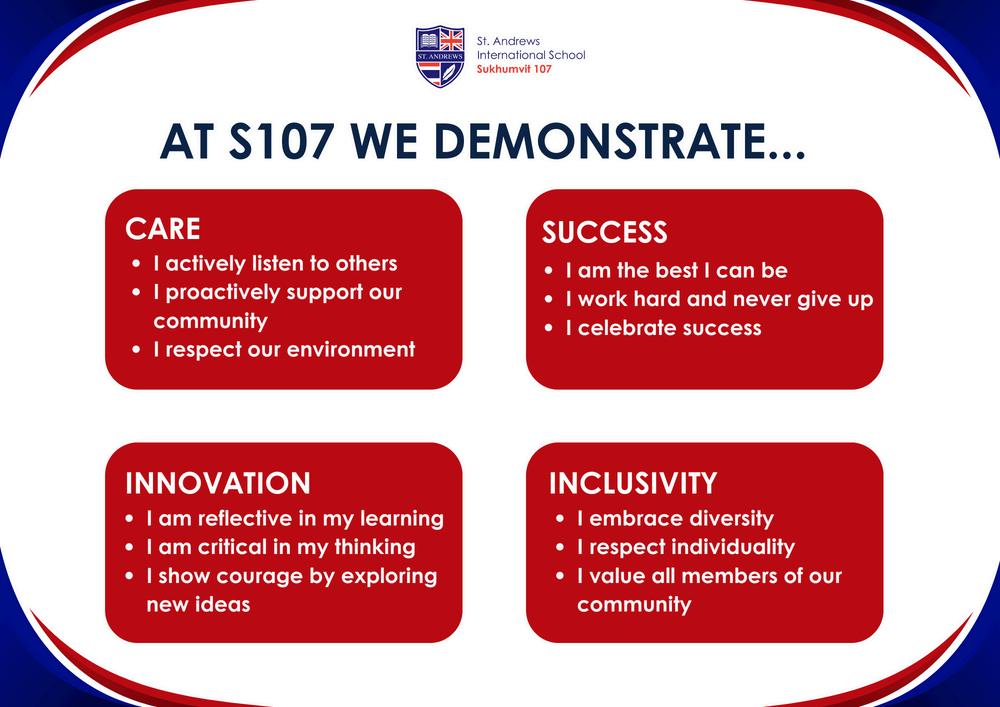
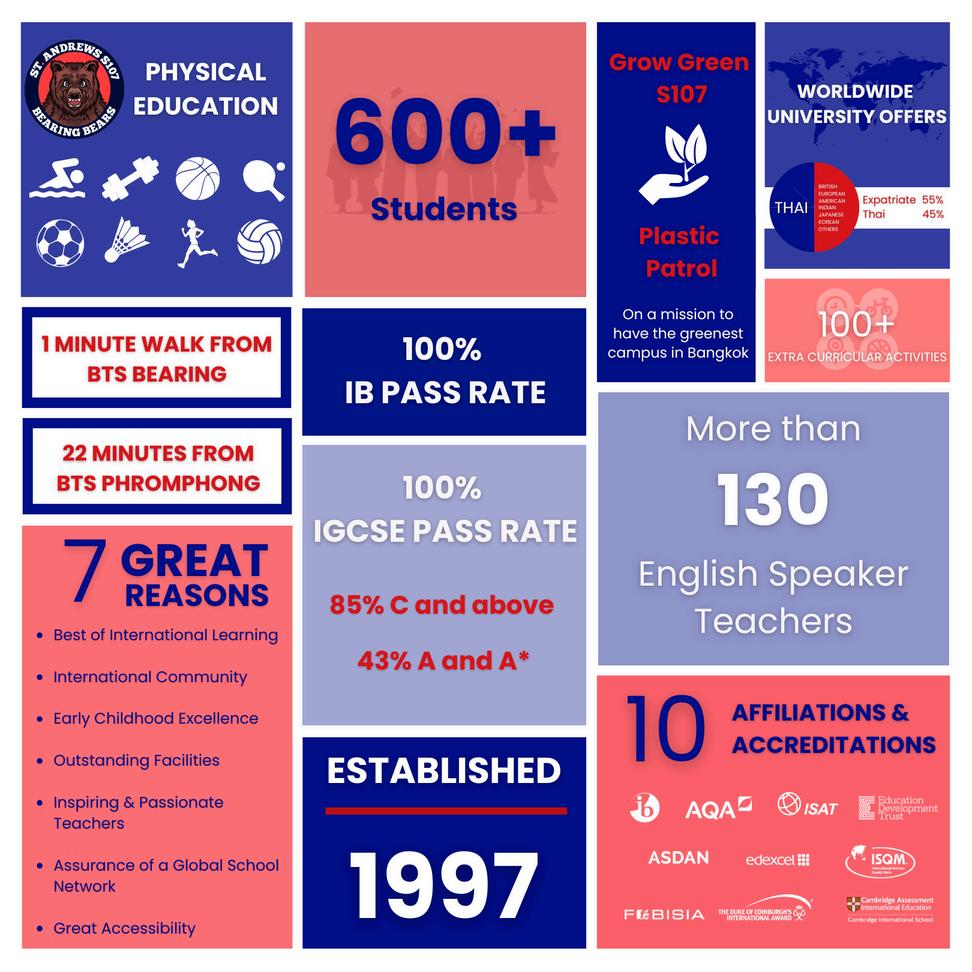







AstheHeadofSchoolatSt AndrewsSukhumvit107 it is with pleasure that I present to you our Key Stage 3 curriculum booklet for the academic yea 2025/26. I take great pride in offering a comprehensive and holistic internationa educationjourneyfromNurserytoYear13
This booklet is part of a series that concisely summarises our curriculum across Key Stage 3 (Year 7, Year 8 and Year 9) This summary plays a pivotalroleinprovidingparents,staff,andstudent with a holistic understanding of our educationa offerings throughout the various phases o schooling. As our students progress, these insight become even more significant, especially when they make crucial decisions regarding thei academic paths, including (I)GCSE and the InternationalBaccalaureate(IB).
I urge you to read this booklet thoughtfully, in conjunctionwithourwebsite Doingsowillgiveyou a deeper appreciation for the unique aspects tha make St. Andrews Sukhumvit 107 a remarkable internationalschool.
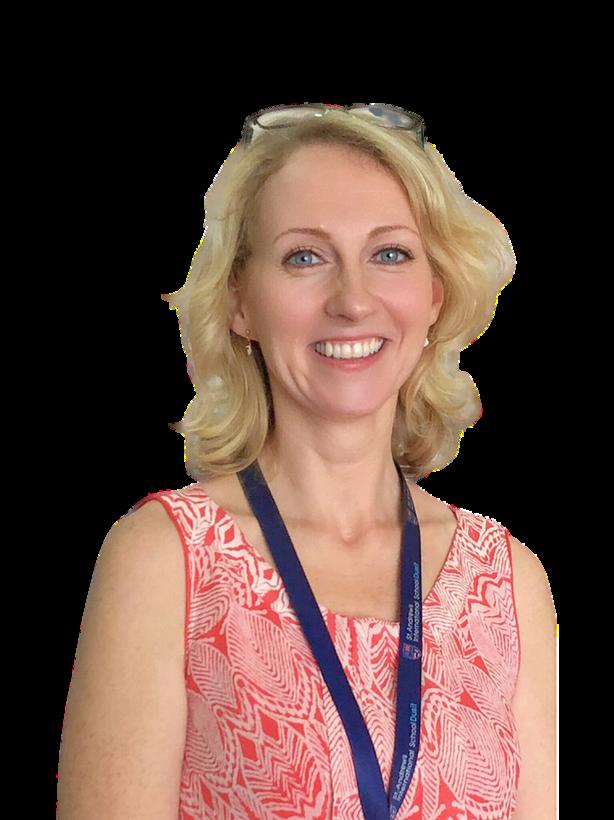
Our students are excelling academically and thriving through our extensive array of learning experiences,bothwithinthecurriculumandthroughourvibrantextra-curricularprogramme
As our students journey through our school, we aspire for them to cultivate independence, motivation, and a thirst for knowledge. We encourage them to embrace challenges, learn from setbacks, and think critically. These skills are the cornerstone of their readiness for further educationandeventualsuccessinthe21st-centuryworkforce
Our commitment to exceptional teaching and learning is a source of immense pride for us, and we hope that this booklet, along with our other publications, offers you deeper insights into our educational philosophy and objectives. Should you require further assistance or information, pleasedonothesitatetocontactusthroughtheAdmissionsOfficeorourPrimaryandSecondary Schooloffices
Thank you for being an integral part of the St. Andrews Sukhumvit 107 community. Together, we shallcontinuetonurtureandempowerthebrightmindsoftomorrow.
CarolineRatcliffe HeadofSchool

“Weexpectourstudentstoacquiretheskillsandmotivationto becomeindependentlearnerswhoactivelyseekknowledge andfulfilmentwhilealsoseekingtoestablishbalanceintheir lives.Wewantthemtotakerisks,learnfromtheirmistakesand questioncritically.” FinbarrCosgrove,HeadofSecondary
AstheHeadofSecondary,Iamdelightedtointroducethe SecondaryprogrammeatSt.AndrewsInternationalSchool Sukhumvit107.S107isanexceptionallearningenvironment where your child's educational journey is nurtured with care,dedication,andacommitmenttoexcellence
St. Andrews Sukhumvit 107 proudly follows the English National Curriculum, which offers a balance of academic rigour, flexibility, and international recognition, making it a popular choice for our families, who are seeking a school thatprovidesahigh-qualityeducationtotheirstudents In KeyStage4,wetakeIGCSEandKeyStage5,IB.
The Key Stage 3 (KS3) Curriculum Booklet serves as a comprehensive guide to our secondary school curriculum inYear7,8and9 Providingdetailedinformationaboutthe subjects, teaching methodologies, and extracurricular activities(ECA's)offeredatthiscrucialstageofyourchild's educationjourney.

StudentsinYear7,8and9followabroadandbalancedcurriculumwhichincludesthefollowing subjects:
Tutortime
English
Mathematics
Science
ModernForeignLanguage(MFL)
Thai
PE
Music
Art
DesignandTechnology
Drama
Geography
History
ICT
EnglishasAdditionalLanguage (EAL)
Students are placed in tiers in Mathematics only, all other subjects are taught in mixed-ability groups.
Students are assessed regularly in a variety of ways, depending on what is appropriate to the subject and the type of learning being undertaken For example, students will regularly sit progress tests, complete extended written assignments or be observed preparing and presenting creative and/or collaborative work. The way in which students’ learning is assessed varies from subject to subject. Details are provided by Faculties in this booklet, and at the beginning of every year, so that students understand the various procedures that apply Feedback is given to students as a regular feature of their ongoing learning in the classroom This takes a variety of forms, and includes written and verbal feedback. In addition, formal feedbackisgivenintheformofwrittenreportswhichareissuedtoparentsfourtimesayear.
HomeLearningisseenasanimportantcomplementaryaspectofS107'sSecondarycurriculum. Students are expected to complete their Home Learning tasks by the specified date and to the bestoftheirabilitywithinthegiventime-frame.
In order to promote personal wellbeing, Key Stage 3 students need to develop effective organisation and time-management skills to ensure their academic obligations are balanced against other interests and commitments. There is a gradual introduction to Home Learning in Year7.
The most important aspect of Year 7 is for all students to settle into Secondary as optimally as possible,andtofeelsafeandsecure BynothavingthefullburdenofHomeLearninginthefirst termoftheirSecondaryprogramme,ouryoungeststudentsareabletoconcentrateonsettling in with their teachers, lessons, learning and organisation, as well as settling in emotionally and socially.
Experience has shown that students respond well to parental interest in their learning and we encourageparentstomonitortheirchild’sHomeLearninghabitsandtakeaninterestinwhatis beingstudiedatschool.
Students are placed in a group which is overseen by a tutor. They meet their tutors every morningforregistration.Tutorsarethefirstpointofcontactforstudentsexperiencingdifficulties. Forsubject-specificconcerns,itisadvisabletocontactthesubjectteacherdirectly. Studentsaretaughtintheirtutorgroupsformostoftheschoolday.Tutorgroupsarearranged withconsiderationofgender,nationalityandability,inordertoensureaswideamixofstudents aspossible
All Secondary students are required to have a personal laptop to support their learning It is primarilyconsideredasadeviceforlearningatschoolandhome
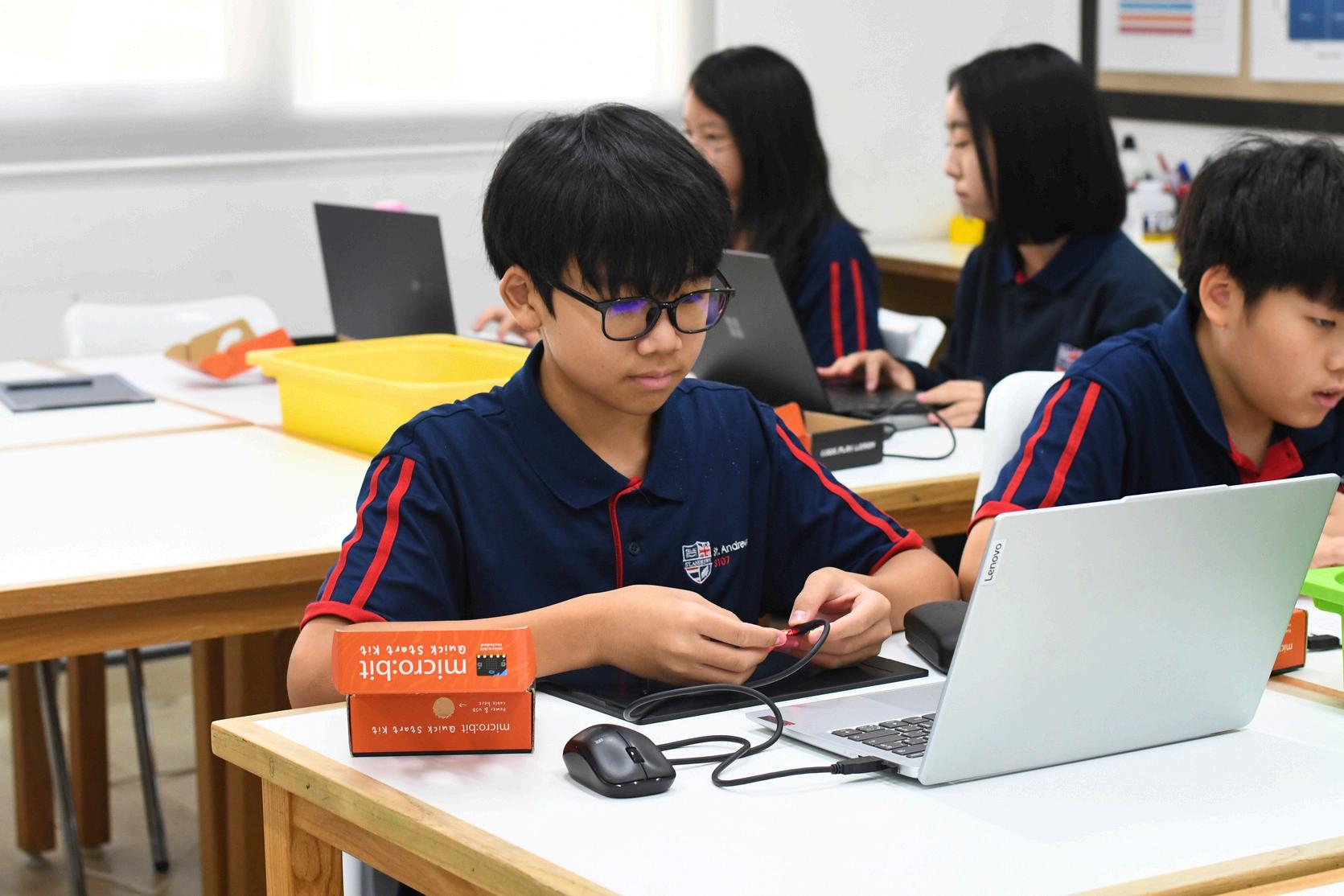
Studentsreceivemostlessonsasdoubleperiods(80-minutes);theexceptionstothisare EnglishandMathematicswhichareallocatedtwo80-minutelessonsandone40-minutelesson each Therearetwobreaktimeswhichthestudentscanuseforeating,recreationorextracurricularactivities
07:45-08:00 Registration
08:10-08:50 Period1
08:50-09:30 Period2
09:30-09:50 Break
09:50-10:30 Period3
10:30-11:10 Period4
11:10-11:50 Period5 11:50-12:30 Period6 12:30-13:10 LunchBreak 13:10-13:50 Period7
13:50-14:30 Period8 14:35-15:35 ECA(Optional)
S107 is dedicated to ensuring a seamless transition for students moving from Primary School (Year6)toSecondarySchool(Year7).Recognisingthesignificanceofthistransitionperiod,the school employs various strategies to support students and parents throughout the process. One key aspect is easing students into the Secondary school curriculum, bridging the gap between primary and secondary education Through carefully designed orientation programmes and introductory lessons, students are gradually introduced to the academic expectationsandrigoursofYear7,fosteringasmoothacademicprogression.
Moreover, the school provides personalised assistance through the Head of Year 7 and Transition Coordinator, Mr Mark, who plays a pivotal role in guiding students through the initial stagesoftheirSecondaryschooljourney.MrMarkoffersindividualisedsupport,addressingany concernsorchallengesstudentsmayfaceduringthistransitionalperiod.
Additionally, new students are paired with buddies, offering a friendly face and a source of support as they navigate the new environment, fostering a sense of belonging and camaraderieamongpeers
Furthermore, the importance of involving parents in the transition process is also recognised. Regularcoffeemorningsareorganised,providingparentswiththeopportunitytoconnectwith schoolstaff,shareexperiences,andseekadviceonsupportingtheirchildrenthroughthisstage.
AspartofourcomprehensiveguidanceprogrammeforYear9students,wededicateafocused session to discuss the key decisions surrounding IGCSE options. Recognising the varied ambitions and talents of our students, our approach is to integrate Unifrog's psychometric testing. This tool has played a key role in mapping students' personalities, interests, and skill sets Following the assessment, each student receives a personalised report highlighting potential career paths aligned with their profiles and recommending specific courses for their IGCSE. This process is designed to empower students with the insights needed to make informed choices about their educational journey, ensuring that their selection of subjects is bothstrategicandalignedwiththeirlong-termaspirations.
All year groups in the Key Stage 3 programme attend a Residential Visit. The mandatory Residential Visits are an integral part of the Secondary School curriculum They provide our studentswithanopportunitytodevelopthroughexperience Oneofthemainaimsistoinvolve them in activities and situations which they may not have experienced before and which encourage them to think about the values which they are applying and the attitudes they adopt. Each visit is designed with a specific programme to help enhance the mainstream curriculumandtoprovideopportunitiesforpersonalandsocialdevelopment Tofollowonfrom theworkinthePrimarySchoolResidentialVisits,eachvisitandrelatedactivitiesareplannedto accomplishthefollowingaims:
• exploration of cultural, historical or physical environments with specific targets linked to the school’scurriculumsetting;
• reinforcement of self-esteem and positive interaction amongst students and staff within a uniquesetting
As students progress through the school, the experiences develop requiring the student to become more independent. As well as the clear curriculum links, the visits will provide the opportunity for students to develop personal and social skills. The following list outlines the typesofareascovered:
independenceandself-discipline
initiativeandproblemsolvingskills
confidenceandself-esteem
leadershipskills
developmentofsoundrelationshipsamong students
theabilitytoenjoytheenvironmentwithout destroyingit
flexibilityandconsiderationforothers abilitytoworkwithothersinateam
developmentofsoundrelationshipsbetween studentsandstaff
communicationskills
The nature of life in Bangkok is that it is sometimes difficult for students to socialise outside school Therefore,anotherimportantreasonfortakingthestudentsawayisforthemtohavean opportunitytosocialiseandhavefun
Currentlythefollowingvisitstakeplace:
Year7
4-nightstayinChanthaburiwithaprogrammerunbytheBarge
This established environmental education integrated trip brings to life academic content from Geography, Science, Thai and more. Students will spend 1 night under canvas, before heading to accommodation in Chanthaburi for the remainder of their trip They will learn about the importance of mangroves through an exploration journey on Stand Up Paddle Boards, sustainablefishingandcampcraft.
4-nightstayinKanchanaburiwithaprogrammerunbyCDRAdventure
Our popular Year 8 residential is in Kanchanaburi Students focus on teamwork and collaboration across a multitude of activities at CDR Adventure but with a focus on building bikingskills.TheyalsoembedelementsofhistoryastheylearnaboutatSaiYokrailwayatthe endoftheirtrektothewaterfall.
4-nightstayinChiangMaiwithCMRCA
This trip aims to get students to push their understanding of themselves through a variety of challenging and adventurous activities Students will engage in a variety of hard skills such as climbing,hiking,andoutdoorcookingallwhilebuildingcommunicationskills,enhancingcritical thinking, and developing an understanding of their peer network. There will also be a focus on living sustainably in nature, with one night camping and sessions on self-sufficiency and wildernesssurvivalskills
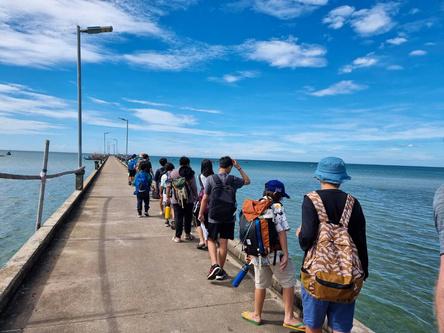

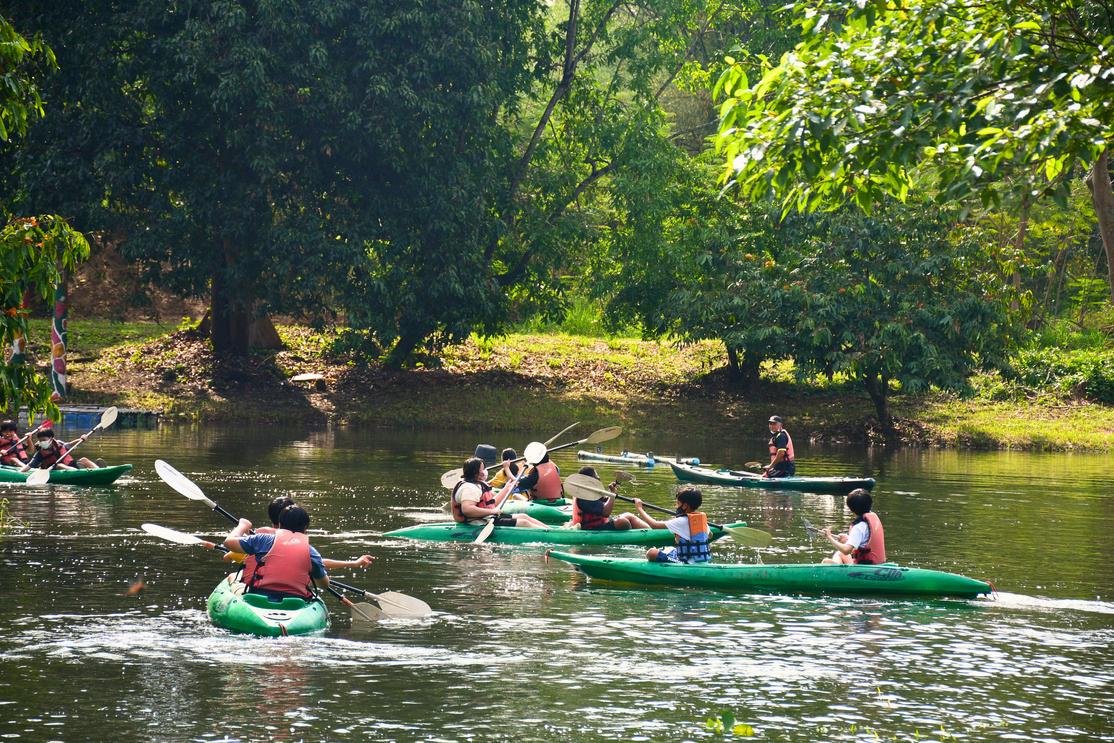


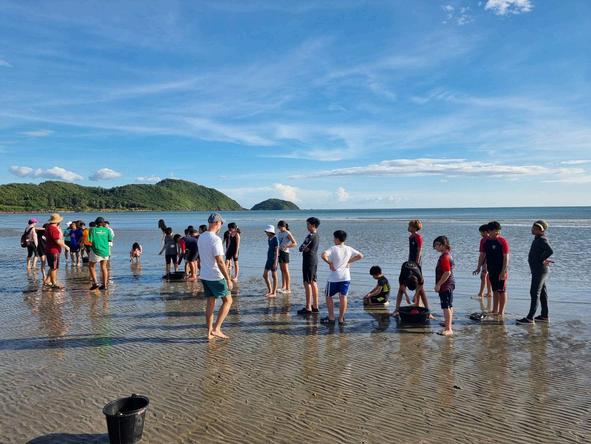
Tomaintain,developandextend:
•anenjoymentofEnglishwithregardstoallofthekeyformsandskills •anunderstandingofthespokenwordandthecapacitytoparticipateeffectivelyinavarietyof speakingandlisteningactivities,matchingstyleandresponsetoaudienceandpurpose; •theabilitytoread,understandandrespondtoarangeoftexts;recogniseandappreciate themesandattitudesandthewaysinwhichwritersachievetheireffects; •theabilitytoconstructandconveymeaninginwrittenlanguage,matchingstyletoaudience, formandpurpose
CourseOutline
Assessment
Studentswilldevelopcompetencyinarangeofsituationswherespeaking andlisteningskillsareparamount:speechmaking,debates,group discussion,presentations,pairedworkandrole-playarethusintegraltothe course.
Readinginclasswillfocusontheskillsofinference,insight,analysisand interpretation.Studentswillreadindependentlyinlessonsandathometo ensurethattheyaredevelopingtheirownprivatereadingskillsand engagingwithtextsthatsuittheirownpersonalinterests.Challengingprose, poetryanddramawillbetaughtthroughouttheKeyStage Writingskillswill focusonadaptingwritingforarangeofpurposesandaudienceswith writingtodescribe,narrate,analyse,persuadeandadviseamongstothers. Studentswillexplorenon-literarytextsthroughoutthecourseto acknowledgethekeyissuesandideasthatarepresentedintheliterary textstheyhavestudied Throughreadingandwritingtherewillbeafocuson expandingvocabularytobetterequipthestudentstouselanguagemore effectively.Studentsalsohavearegularweeklyvocabularybuildingthrough readinghomeworksetontheBedrocklearningplatform
Description Time
Studentswillbeassessedforreading,writingandskillsofliteraryanalysis, progressingindifficultyeachyear.Theworkwillbeinawidevarietyof formsandgenres Studentswillcompletetwoassessedpiecesineach modulemostofwhichwillbesatintimedconditionsintheclassroom At theendofeachschoolthereisaformalreadingandwritingtestforthe entireyeargroup.
Inthemiddle andendof eachmodule
TimeAllocation
Year7,8and9
Fivex40-minuteperiodsperweek (2doublesand1single)
Structure
StudentsaretaughtinsetsbasedontheirbaselinedatascoresatthestartofYear7and ongoingteacherassessmentthereafter.Sets1and2(and3inthecurrentfourstreamYear7) followarelativelysimilarcurriculumtoeachother,butSet3(4inYear72024-25)ismuchmore focusedonincreasingthestudents’leveloflanguage Theyearissplitinto4teachingmoduleswithdifferentfocusessuchaspoetry,playscripts, novels,non-fiction,genreortimeperiod.

AtS107webelievethatthestudyofmathematicsprovidesstudentswithrichknowledge,skills anddeepconceptualunderstandingofmathematicalconceptssothattheycantake advantageoftheopportunities,responsibilitiesandexperiencesoflaterlife.
ThefocusoftheteachingofMathematicsatS107is:
Tobuildonpriorknowledgeandprovidethebuildingblockstobeabletoproceedtostudy mathematicsatahigherlevel
Todevelopfluencyofproceduralmethodsbeforedevelopingskillsinapplication,reasoning andproblemsolving.
Ensurestudentsarehighlymathematicallyliterate,numerateandmathematicallycreative. Westrivetoprovideopportunitiestointerweavemathematicaltopicsbothinmathsand othercurriculumareas
Toinspirestudentstoseethebeautyofmathematics,tobeconfidentmathematiciansand recognisetheopportunitiesitcreatesforthem.
WefollowtheWhiteRoseMathscurriculumthroughKS3andintoKS4,pickingupwhereour colleaguesleftoffinprimaryschool.Thisensuresthatthecurriculumbuildsonpriorlearning throughincrementalsteps,allowingteacherstodeliverwithbothbreadthanddepthateach stage Weknow,fromresearch,thatteachinginsmall,relatedchunkshelpsstudentssecureand embedmathematicalconceptsandtechniques,andhelpsthemunderstandtheirlearning
MappedoutbelowistheteachingsequencefortopicscoveredacrossKS3.Theorderisfollowed butthetimespentoneachunitmayvarywithlearnergroups.Teachersareaskedtoensure knowledgeandlearningissecurebeforemovingontothenextstep.
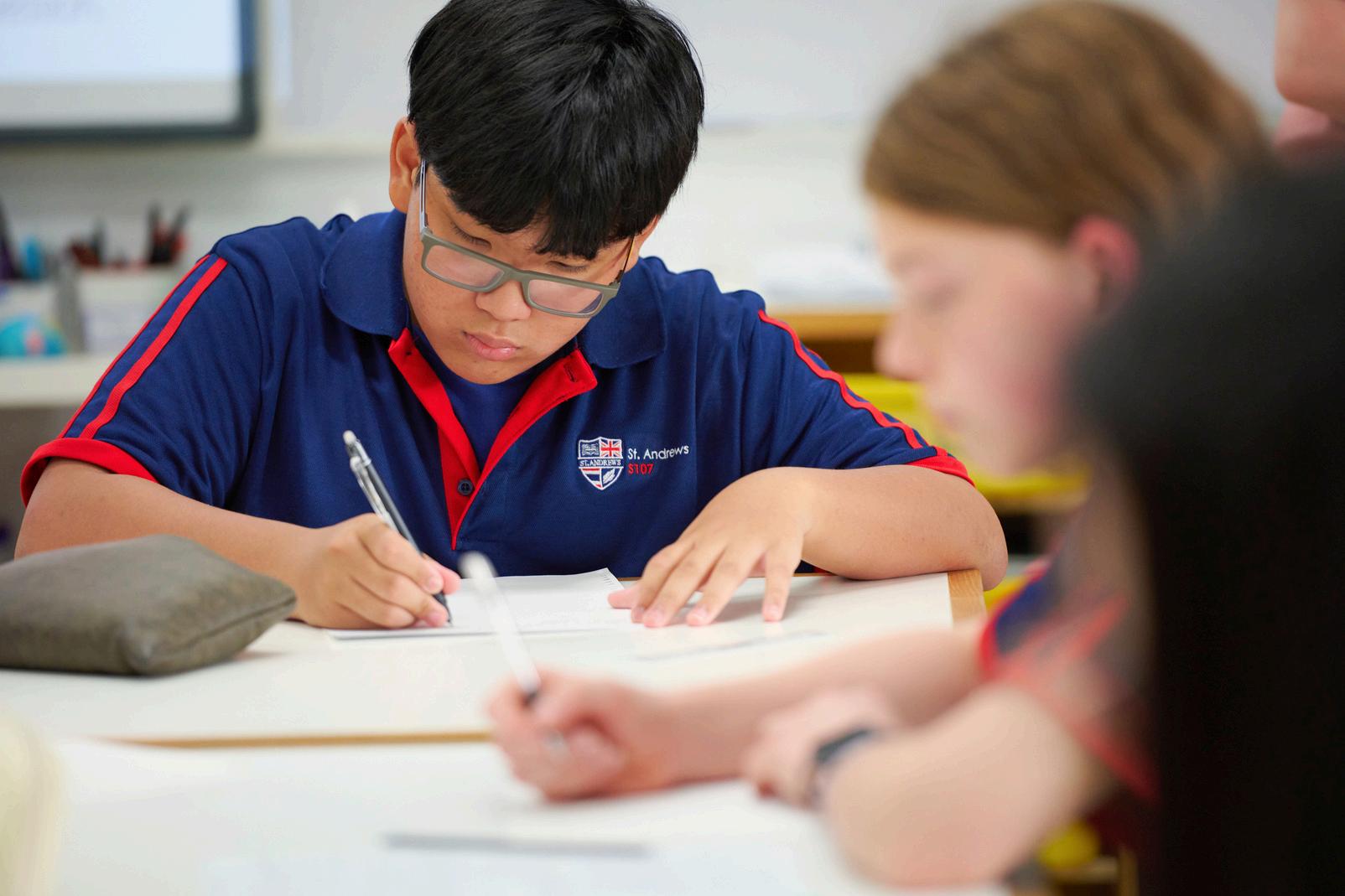
TimeAllocation
Fivex40-minuteperiodsperweek(2x80minsand1x40mins)
Assessment
Studentslearningmathematicsareregularlyassessedinthefollowingways:
TopicTemperaturechecks-attheendofeverytopic
Thesearequick20-markassessmentscompletedinclassthatinformtheteacheraboutwhich smallstepsorconceptsaresecureandwhichmayneedtoberevisited,eitherdiscretelyoras partofarelatedtopic.
These assessments take place towards the end of each term after every 6/7 topics of work. Students may use a calculator for these assessments and should have a full complement of mathematicalequipment(protractor,compass,ruler)tosupportthem.
Assessmentscovercontenttaughtsofarinthatcurrentacademicyearandtheyearspreceding it.Studentsshouldexpecttohavetoreviselearningfromyearslowerdowntheschoolaswellas thenewlearningthathasbeencovered.
The assessment is a 70 min exam paper comprising two parts Core and Applied (40 marks each) Thecoresectionofthepapercoversmathematicalcontentindiscreteskillsandenables stafftoseewheretherearegapsinknowledgeandprocesses.
The applied section looks at the same skills but in different contexts, often blending strands of mathematics. These questions often look to see if students can discern the maths they need to usetosolveaproblem
Theoutcomesfromtheseassessmentsarerecordedandreportedhome.
All maths homework across years 7-11 is set via this platform Homework is about an hour in lengthandissetweeklyonWednesdayat4pmandduethefollowingWednesdayat3pm.
Theplatformtracksalongsideourteachingcurriculumandeachhomeworkhas3sectionstoit:
Compulsory:Mustbecompletedwithintheweeklydeadline NewLearning:Workcurrentlybeingcoveredinmathslessons.
Consolidation:Revisitstopicsfrompreviousunitsandacademicyears. TimesTables:Developsandimprovesmultiplicativereasoningskills.
XP Boost: Revisits topics that students have already encountered at the same level or an easier levelthantheyarecurrentlyworkingat.Thishelpstoconsolidatenewlearning.
Target Boost: Focuses on current topics in greater depth and provides students with the opportunitytoexploreamathematicalstrandinmoredetail.
Sparx is an AI based programme that adjusts the homework and questions to support learners attheirlevelwhilstassessingthemconstantlysothatdepthoflearningincreasesincrementally. To get the most out of the platform 100% of the compulsory homework must be completed weeklythisenablesSparxtopersonalisethehomeworkmoreeffectivelyforeachstudent.
The unique feature of Sparx as an online platform is that students are required to complete bookwork alongside their homework. This helps both students and staff to better understand whereerrorshavebeenmadeandaddressmisconceptionsbeforetheybecomeingrainedina student’smathematicalroutines
Moreimportantly,itestablishestherigourofmathematicsandencouragesstudentstodevelop thegoodhabitofshowingtheirworkings.
Booksarecollectedateverymid-termandend-of-termbreaksothatstaffcanreviewstudents' work
We want all students to succeed mathematically, and to achieve this, it is important that they are given the opportunity to learn in an environment that provides depth of knowledge rather than accelerated content. As such, our groups are structured to maximise learning and are adjusted for each year group based on their context. The current structures for each cohort in KS3areoutlinedbelow:
Mixedattainmentgroups Mixedattainmentgroups
1Extensiongroup
2Mixedattainmentgroups
The relationship between teacher and pupils is a vital one especially in mathematics where students often find the feeling of failure or wrestling with a topic can negatively determine their approachtolearninginfuture
In year 9 we begin the process of identifying students who may wish to sit Further Pure Maths iGCSEalongsidetheiriGCSEmaths.Thesestudentsareintheextensiongroupandcoverthesame content as the rest of the year group at the same pace but are given the opportunity to further exploremathematicalconceptswithevengreaterdepth Oncethesestudentsreachyear11they havetheoptiontobeenteredforanadditionalmathematicsqualification.
The focus for all our students is to experience success and secure the very best grades in their iGCSEMathsinthefirstinstance
Studentsareinitiallyplacedintogroupsbasedontheirabilities,withasinglehigh-abilitysetand theothergroupsbeingmixedability Thehighlycapablestudentsinthehigh-abilitysetundergo accelerated learning, commencing the IGCSE programme in Year 9 If deemed ready, they take the extended IGCSE Mathematics Exam at the conclusion of Year 10. Subsequently, in Year 11, these students delve into Further Mathematics IGCSE, preparing them for the International Baccalaureate(IB)programme.
Meanwhile, the majority of students from other groups, particularly those in the mixed-ability categories, follow the extended IGCSE Mathematics course They embark on this programme in Year 10, with their final exams scheduled for the culmination of Year 11. The remaining students from the mixed-ability groups, possibly along with some from the high-ability set, pursue the coreIGCSEMathematicscourse.Similartotheirpeersintheextendedcourse,theycommencein Year10andsittheirfinalexamsatthecloseofYear11
It'snoteworthythatduringKeyStage3,thereisflexibilityintiermovementtoalignwithindividual studentprogress,andsetplacementdoesnotimmediatelyimpactexaminationentries.
We are committed to ensuring that our most able students are continuously challenged in all aspectsoftheirmathematicallearning Belowisalistofstrategiesweimplementtoachievethis
•Thefacultyismadeupofmathematicsspecialistswhoarepassionateabouttheirsubject.This allowsfor"on-the-spot"extensionandenrichmentthatisindividualisedtosuiteitherthestudent orthesituation.
• Teachers are constantly considering which learning experiences will provide sufficient challenge for their most able students With a wealth of resources at hand, a lesson is rarely without a task that allows students to really delve into their understanding of a particular concept.
•Students have the opportunity to participate in UKMT Maths challenges throughout the academicyear
TheaimsoftheSciencecurriculumatKS3levelareto:
Develop a solid foundation of scientific knowledge and skills through the disciplines of biology,chemistry,andphysics. Give students the application skills to face novel challenges with confidence and apply scientificknowledgeinexplainingobservationsabouttheworldaroundthem. Stimulatestudents’naturalcuriosityandigniteapassionforscience
TimeAllocation
AllKS3studentsreceivefourx40-minuteperiodsperweek,alwaysarrangedasdoublelessons (twox80minutelessonsperweek) Thesedoublelessonsprovidesufficienttimeforin-depth laboratorypracticalwork.
Inadditiontoanend-of-yeartest,studentsaregivenfrequentend-of-unittestsaswellasskills assessmentsinordertotracktheirprogressastheycontinuethroughthecurriculum InYear9, studentsbeginstudyingIGCSEScienceinterm2andtheirend-of-yearexamfocusessolelyon IGCSESciencecontent.
Thecoursestructureandassessmentscheduleisasfollows:
(ungraded)
EcosystemProcesses Term1.1
ElectricityandMagnetism Term12
ChemicalReactions1
BodySystems
EnergyandMatter
ChemicalReactions2:Metalsand reactivity
ENDOFYEARASSESSMENT
Chemicalreactions2(continued) Term3
SkillsAssessment
Fermentationin Yeast
Electromagnets
Neutralisation
DrawingDigestive System
Investigating Insulators
Rusting
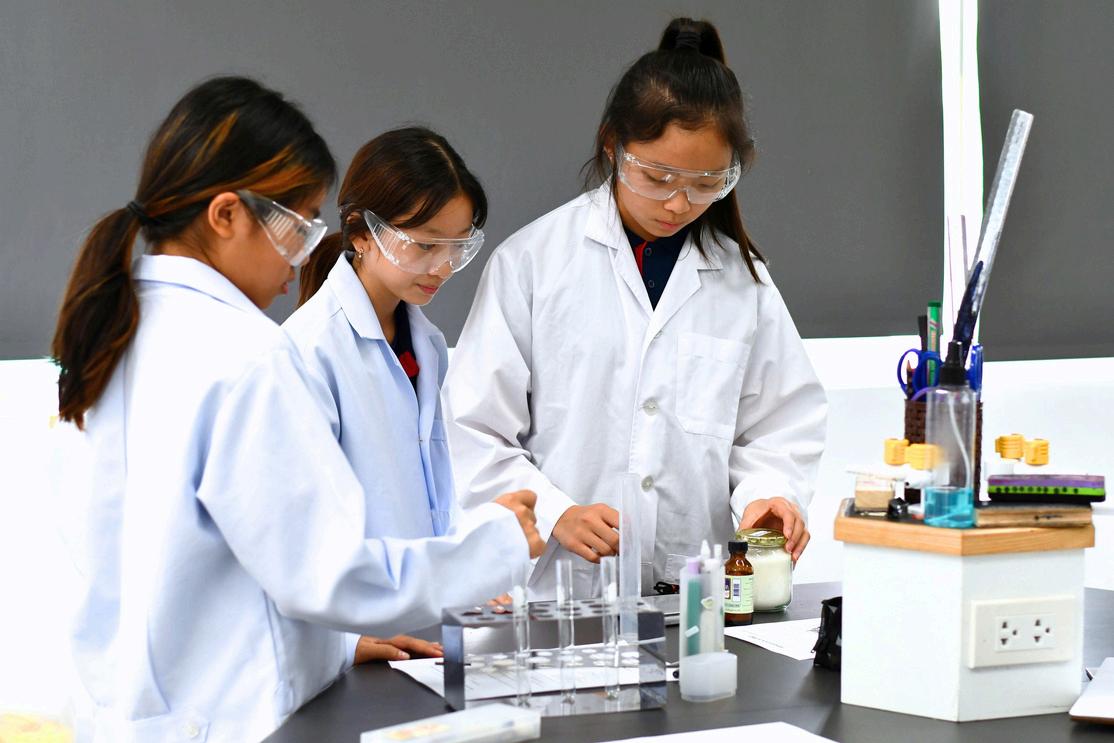
Reactions3:EnergyandRatesof Reaction Term1.2
VariationandInheritance Term1.2
ForcesandMaterials Term21
IGCSEBiology Term2.1
IGCSEPhysics Term3
ENDOFYEARASSESSMENT Term3Week6 (IGCSE-only)
Sound/Lightin Animals
RatesGraphing
Variation
Hooke'sLaw
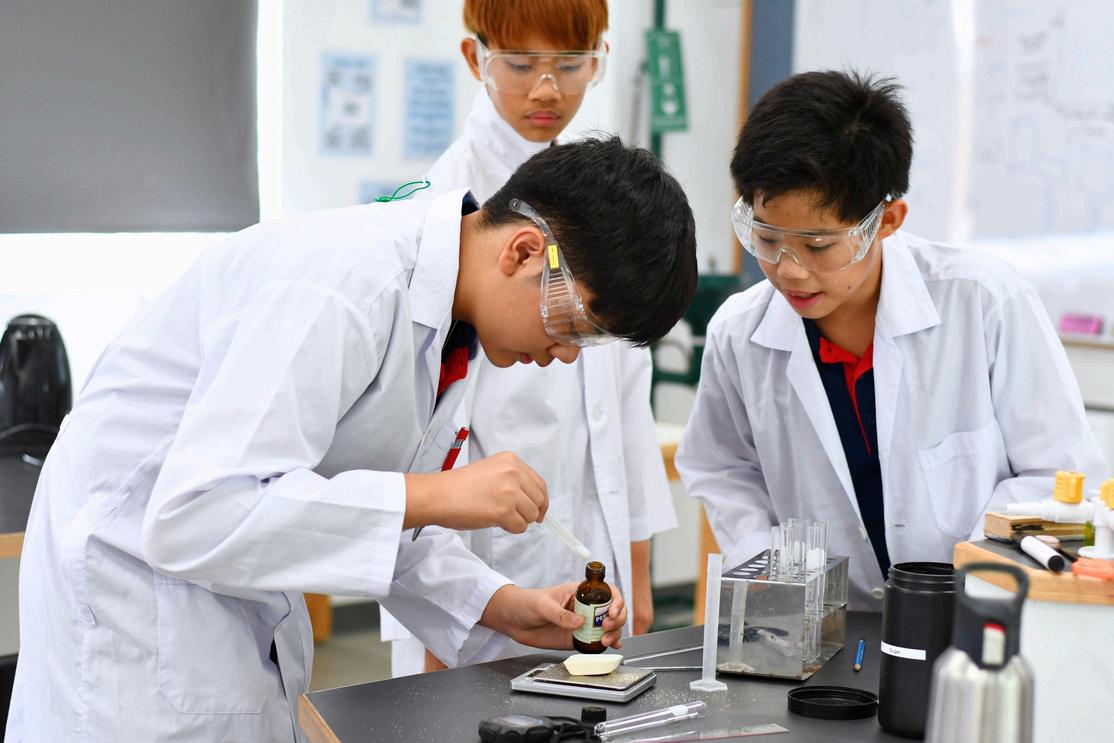
French
Mandarin
Spanish
French,Mandarin,Japanese(IGCSE1stlanguage&IBLangAaswell)
Aims
KS3 students develop their ability to communicate in the target language through the study of themes and written and oral texts, also developing a conceptual understanding of how language works based on prior knowledge from primary. Students have to communicate in speechandwritingshowingknowledgeofarangeofvocabulary,usinggrammarandstructures accurately,appropriatetothesituation. Theyhavetounderstandandrespondtoreadingandlisteningtasks,showingcomprehensionof avarietyoftopics
The themes studied during KS3, the strengthening of the range of vocabulary and grammar as well as knowledge of the culture of the target language allow students to make the smoothest possibletransitiononsolidfoundationstotheIGCSE,havingacquiredsufficientknowledgeinall four skills Obviously, independent work outside the class on regular speaking and listening practiceisimportant.
Theweightingofeachskillareequallyimportant:listening,speaking,reading, writing.
Students work on subtopics per half term, which allows them to cover and review vocabulary and grammar regularly: personal identification, relationships with family and friends, holidays, food and drink, sport and leisure, school, money matters, shopping, the world around us, the worldofworkandhealthyliving.
The structure and grammar of the languages studied are taught in context and through the topics Students are expected to become increasingly aware of and be able to use more complexgrammaticalstructuresastheymoveupthroughthecourses.
French&Mandarin
Y7 3x40-minutes-1single&1double
Y8 3x40-minutes-1single&1double
Y9 3x40-minutes-1single&1double
Spanish
Y7 2x40-minutes- 1double
Y8 2x40-minutes- 1double
Y9 3x40-minutes-1single&1double
Students are continuously assessed throughout the year to ensure their progress in the four skills, with formative and summative tests spread across the different half terms, interspersed with regular oral and written tasks (role plays, audio, video, etc) Students are aware of their learningobjectives,aswellastheleveldescriptors,whichallowsthemtofocusonpersonalised worktostrengthentheirstrengthsandtheareaswheretheystillneedtoimprove.

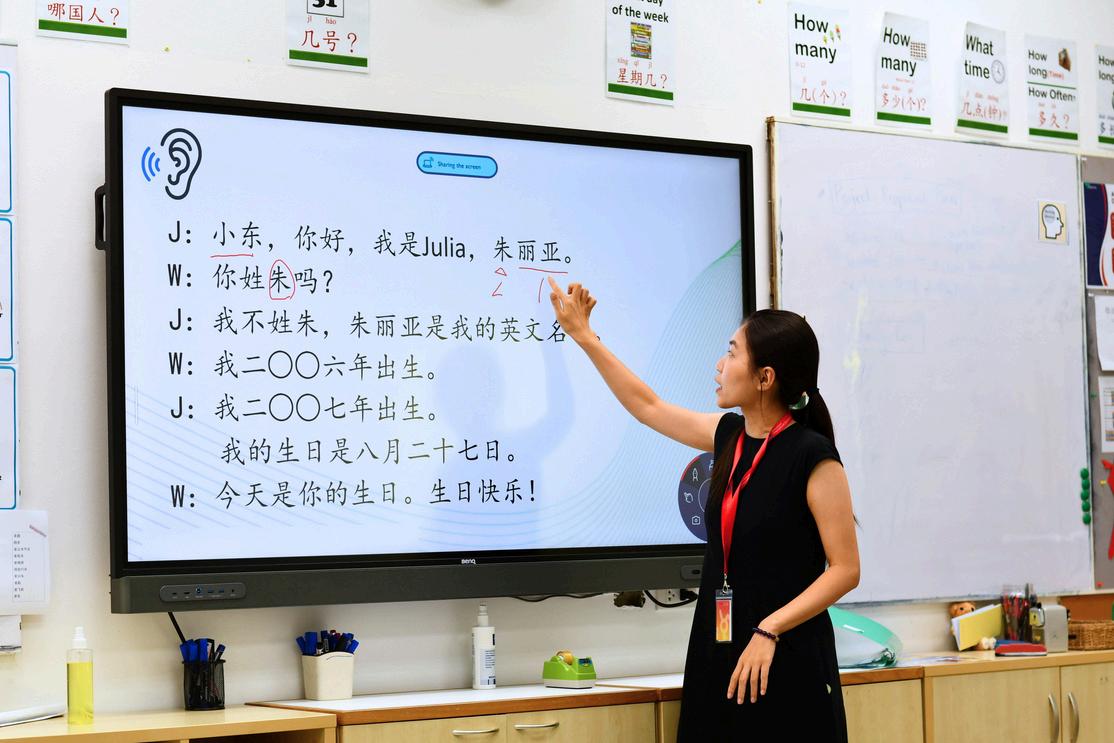
TherearetwoThaicoursesofferedtoKeyStage3students:
1.ThaiasaFirstLanguage
2 ThaiMFL(Non-ThaiStudents)
All courses teach an appreciation and understanding of Thai culture through reading, writing, speakingandlistening.
CourseStructure
ThecourseunitsaredesignedaccordingtoMOEstandardsofThailanguageandCulturefor Thaistudentsininternationalschools
Aims
Thecourseaimstodevelop:
•thefourlanguageskillsandlanguagecompetencenecessaryforeffectivecommunication;
•knowledge,understandingandappreciationofThaiculture;
•high-orderthinkingskillsandproducecriticalresponsestoavarietyofliterarygenresand socialissues
CourseOutline
1 ThaiFirstlanguage
Year7
Mom,ashortstory
Readingcomprehension
Summarisingaworkoffiction
Understandingtheuseofliterarydevices Wordchoices
Improvingspelling Wordchoices
Conjunctions
Culture:
WaiKhruCeremony
TheLateKing’sBhumibolMemorialWeeks LoyKratongFestival
Year8
LiteraryStudies
“ChangSamRan”
The impact of current media shapes how people's thoughts and actionsareperceivedindifferentways.
Toanalysetheliteraryelementsofthestory. Toidentifythemainideaofthestory Tosummarisethestory
Tocreatesentencesusingthevocabularylearned.
To enhance general knowledge of the impact of different ads in variouscultures.
Culture: WaiKhruCeremony
TheLateKing’sBhumibolMemorialWeeks LoyKratongFestival
Unit1:IntotheWriting
Inquiry statement: Written communication is one of the significant elements to convey meaningful and effective texts to the readers (Languageaspects)
WanTiiPhomTuenSaay
Tounderstandfactsandopinions
Year9
Assessment
Tounderstandhowtoconstructquestionsregardingfacts,opinions, andconcepts
-To explore various academic non-literary texts both in print and media-Tosummariseandidentifyreadingtexts
Culture: WaiKhruCeremony
TheLateKing’sBhumibolMemorialWeeks LoyKratongFestival
Year7,8 and9willusethesimplifiedguidedassessmentsdevelopedfromtheIGCSEThaiFirst Languagecriteria,aswellasamorerigorousassessmentacrossthelanguageskillsthroughout theyearintermsofformativeandsummativeassessments.
There are two tiers of Thai Language and Culture courses offered to cover the five levels of language proficiency: beginner, confident beginner, intermediate, confident intermediate, and advanced.
1
2
todevelopstudents’ proficiencyin orallanguageskills andacquirearange ofvocabularyand grammatical patterns; toimprovestudents’ readingcomprehensi onandwritingskills; toencourage studentsto enjoy,understand andappreciate culturalaspectsof Thailives
todevelopstudents’ communicationskills ondailysituations forthestudentsto acquirebasicsurvival vocabularyand simplegrammatical patterns; tointroducestudents tofundamentalThai readingandwriting; toencourage studentsto enjoy,understand andappreciate culturalaspectsof Thailives
Throughthelearning andexplorationoffive culturalthemesincluding: Allaboutme Communityaroundus ExploringThailand Interculturalism Thaiwisdomand beliefs
Tier1curriculumis designedtodevelop students’ languageproficiency from confidentintermediateto advancedlevelswithan emphasisonreadingand writingskills
Tier2curriculumis designedtodevelop students’ languageproficiency frombeginningto intermediatelevelswith anemphasisonspeaking andlisteningskills
Year7
Year9
PleasenotethatThainationalsmustalltakeThai1stlanguage,whiledualnationalsandforeign students may be given the option to join 1st language lessons if their language proficiency is sufficient.

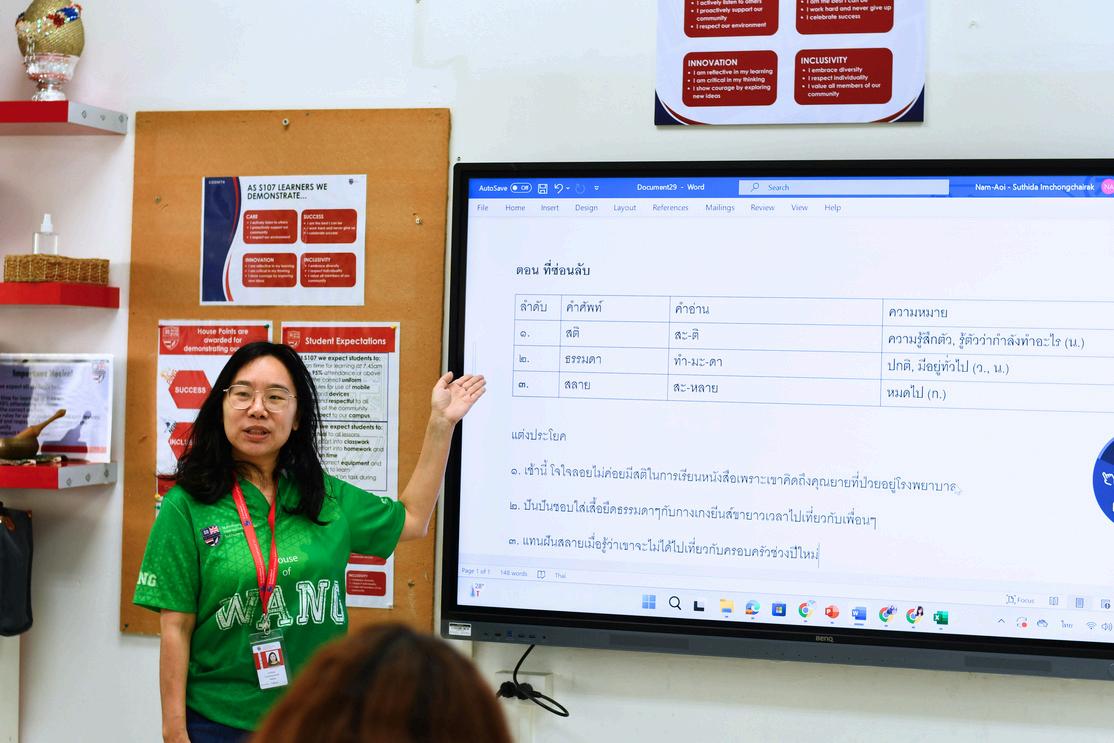
Aims
AtS107,wehavethefollowingaimsforKS3PhysicalEducation:
Toallowstudentstoexperienceabroadandbalancedcurriculum Todevelopaloveofphysicalactivity
Toimprovepersonalandinterpersonalskills,includingcommunicationandteamwork. Forstudentstodevelopanappreciationofpersonalhealth,well-beingandfitness.
CourseOutline
S107studentswillstudyawidevarietyofactivities:
Athletics
Badminton
Basketball
Floorball
Football
Handball
TimeAllocation
1x80minutePElessonperweek
OAA
PersonalFitness
SportEducation
Striking&Fielding
Swimming
TouchRugby
UltimateFrisbee
Volleyball
Waterpolo
1x80minuteenrichmentactivitylessonperweek,KS3only
CourseStructure
StudentsaretaughtinmixedsexandabilitygroupsforYears7,8&9.Studentsareexpectedto havethecorrectS107PEkiteverylesson Ifastudentisnotparticipatingintheactivity,thenthey willbeundertakinganotherrolewithinthelesson,forexample,officiating
Assessment
Studentsareassessedthroughtheirperformanceofphysicalskillsaswellasunderstandingof conceptsineachactivitytheyparticipatein
PElessons
Safe,funandactivelearning
Maximisephysicalactivity
Fosteraloveofphysicalactivity
Developstudentassportsleadersforthefu
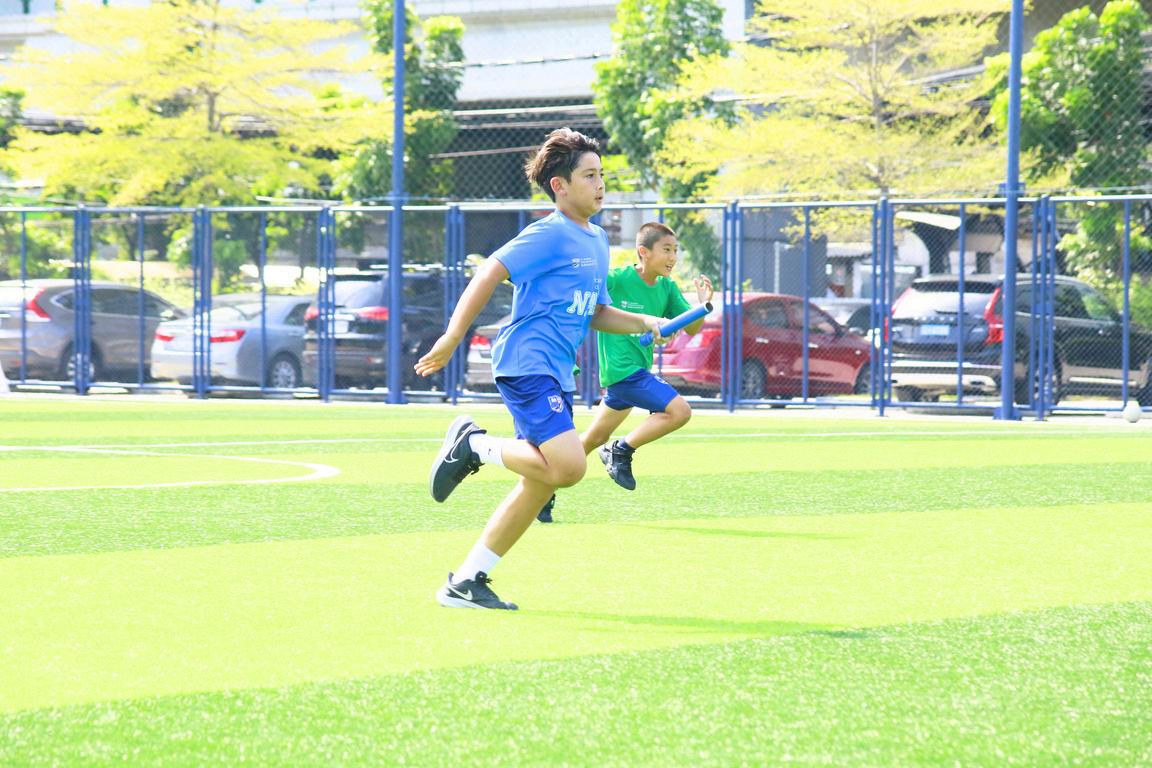
TherearethreemainaimsinthedesignofthemusiccurriculumatS107: tomeetandsurpasstheaimsandcontentgivenbytheEnglishNationalCurriculum. toprepareandequipeverystudentwiththeskills,knowledgeandabilitiestheyneedto succeedatKS4studyandbeyond tofosteralifelongappreciationforandloveofmusic.
The Key Stage 3 Music curriculum at S107 provides students with regular opportunities to refine anddevelopthecoreskillsofperformance,composition,listeningandunderstanding.Eachunit of work has a primary focus of performance or composition, with listening and understanding formingalinethroughoutthecurriculum.
In Year 7, students will be introduced to basic performance skills on a selection of 4 different classroom instruments; keyboard, guitar, bass guitar and ukulele Students will then choose which instrument they wish to specialise in for the remainder of KS3 performance work - this helpsourstudentstodevelopgreattechnicalabilityontheirchoseninstrument.
Year7:
ThemeandVariations-Composition
You’reintheBand-EnsemblePerformance(classroominstruments)
Samba-EnsemblePerformance
MelodyMaker-Composition
InstrumentalSkills-EnsemblePerformance(classroominstruments)
Year8:
BattleoftheBands:RockOn-EnsemblePerformance(classroominstruments)
DjembeDrumming-EnsemblePerformance
TernaryandRondoForm-Composition
IntrotoDAWs-Composition(MusicTech)
AllBlues-EnsemblePerformance(classroominstruments)
Year9:
Battle of the Bands: We’re Jammin’ (Reggae Music) - Ensemble Performance (classroom instruments)
CanoninDAW-Composition(MusicTech)
MinimalisminMusic-EnsemblePerformance
MusicfromtheStageandScreen-Composition
PopSongComposition-Composition
2x40-minuteperiodsperweek
Students will typically receive a piece of home learning every 2-3 weeks. It is expected that studentstake30-40minutestocompletethehomelearning.Thehomelearningtaskswilloften beconsolidationtasksbasedonrecentclasscontent,orpracticetaskstobuildconfidencewith specificskills
Assessment
Studentswillcompleteonelargepieceofformallyassessedpracticalworkeveryhalfterm.This large piece of work will either be: a solo performance, an ensemble performance, or a composition
Studentswillalsobeassessed -informallyevery2-3weeksonspecificskills,suchasreadingtrebleclefnotation - at the end of each term, with tests that cover the listening and understanding content from eachterm

TherearethreemainaimsinthedesignoftheartcurriculumatS107: TomeetandsurpasstheaimsandcontentgivenbytheEnglishNationalCurriculum Toprepareandequipeverystudentwiththeskills,knowledge,andabilitiestheyneedto succeedatKS4studyandbeyond.
Tofosteralifelongappreciationforandloveofart.
Studentswillnormallystudythreekeyunitsperyear.Thecontentoftheseunitswillvary,but typicaltopicsinclude:ObservationalDrawing(StillLife),ElementsofArt,Painting,ColourTheory, and3-DimensionalWork Studentswillbeencouragedtoexperimentwithandexploredifferent materialsduringtheseunits.Eachunitwillincluderesearchandlinkstoatleastoneartist and/orartmovement.Explorationofmaterialsandtheoreticallearningwillberecordedin sketchbooks,andpracticalskillsdevelopmentwillberecordedinfinalartworksattheendof eachunit
Theunitstaughtwillincludeoneormoreofthefollowingskillareas:
Drawing
Painting
Sculptureand3DDesign
Drawingisfundamentaltostudents’progressinArtandtaughtas distinctunitsineachyear,aswellasunderpinningmostoftheprojects studentswillcomplete
Paintingtechniqueswillfeatureinmostunitsinallyeargroups Initially asamethodofexperimentingwithcolour Asstudentsprogress throughKS3,paintingwillbecomemorefineartfocusedwith dedicatedunitsfocusingonprocessandtechnique
Studentswilllearntoproduceworkthatmakescreativeuseofform andspace.Studentsmayworkwithwire,cardconstruction,papier mache,airdryclay,andfoundforms.
CreativeThinking
Students'abilitytothinkcreativelyandoriginallyisnurturedthrough everyunitandeachyeargroup.Creativethinkingnotonlyunderpins everydisciplineofartanddesignbutalsoallowsstudentstotransfer theircreativitytoallareasofthecurriculum.
Year7:
BasicDrawingSkills–ObservationalDrawingandTonalShading
ShapeandForminArt–StillLifeDrawing
Perspective–One-PointPerspectiveDrawing
IntroductiontoClay–SculptingTechniques
ClayProject-SugarSkulls+MexicanCulturalStudy+FridaKahloArtistStudy
IntroductiontoColourTheory–Primary,SecondaryandTertiaryColours
PaintingProject-MonochromaticScheme,BasicAcrylicPaintingTechniques
Year8:
ExploringTexture–DrawingandPainting
ColourTheory–Primary,SecondaryandTertiaryColours
ArtMovementStudy-PopArt,BlendingwithOilPastels
PopArtOilPastelProject-WayneThiebaudCupcake
PaintingTechniques-AcrylicPaint,MixingTint,Tone+Shade
FinalProject–GemstonePaintings
ClayProject-CreativePinchPots(liddedvessels)
Year9:
AdvancedDrawingTechniques–Observationaldrawing
FigureDrawing+Proportion–Drawingthehumanfigure
AdvancedShading–ValueScale,TonalDrawingstudies
MixedMediaExploration-Varietyofartmediaandsurfaces
ClayProject-3DPaintings
ArtHistoryandStyles–StudyofMovementsandStyles
FinalProject–DevelopmentofPersonalArtProjects
S107TimetableAllocation
Twox40-minuteperiodsperweek
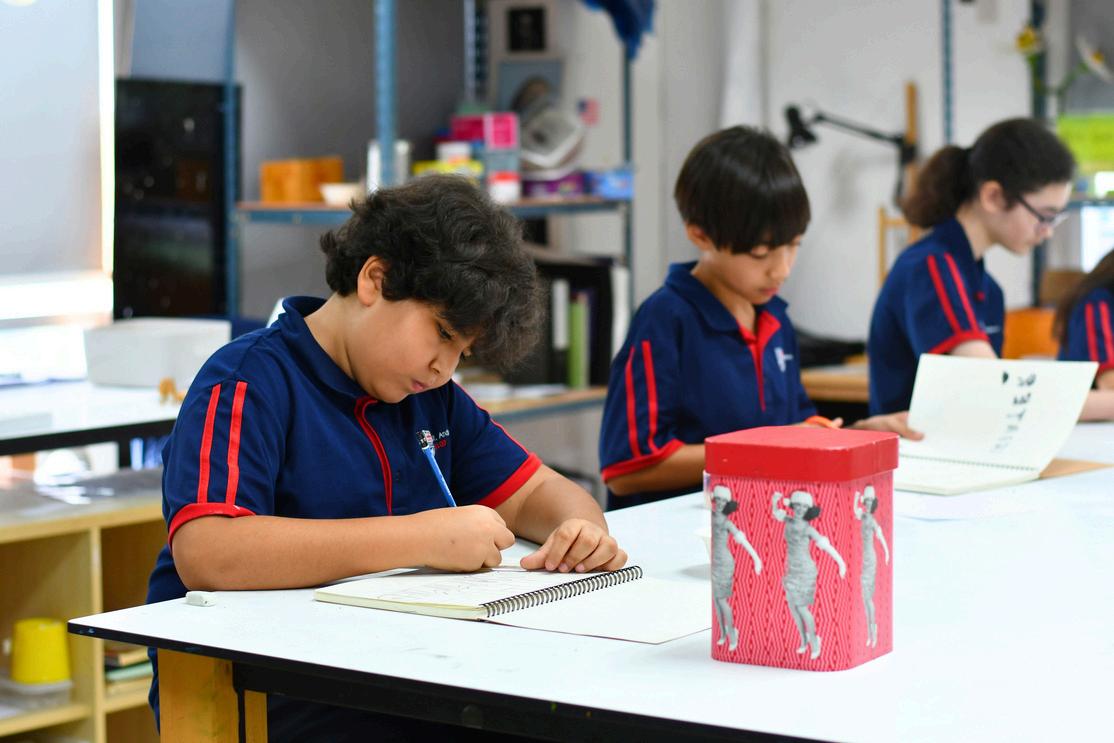
Studentsareassessedaccordingtoendofunitresult,modifiedforanendofyearoutcome. Assessmenttasksarevariedforeachunit.However,foreachunitstudentswillbeassessedon thefollowingareas.
Understanding
Development
Presentation/ TechnicalSkills
Theoreticaland Practicalformal assessment
SelfAssessment/ PeerAssessment
Theworkproducedeachlessonwilleitherberecordedinartjournals throughlessonbasedtasksorformpartofafinishedpieceofartwork. Studentswillberegularlyassessedfortheirunderstandingduringeach unitbasedonthelessontopic,theoreticalorpractical
Unitsarestructuredaroundprogressivelychallenginglessonsdesigned tobuilduponpreviouslearnedskillsortechniques.
Assessmentwillbebasedonthestudents'abilitytoimprovethe presentationoftheirwork,demonstratingimprovementintechnical abilityandunderstandingoftheprocess
AllunitsofworkinKS3willresultinapracticalassessmentbasedupon thetechnicalresultsofafinishedartwork Mostunitswillalsoincludea writtentheorytest/quiztoassessunderstanding
Reflectontheirownachievements;reflectonpossibleareasforfocus; acceptandincorporateviewsandfeedbackfromotherstofurther developtheirartisticpotential;showself-motivationinsettingand meetingdeadlines;demonstrateinitiative,creativity,andawillingnessto takerisks;supportandencouragetheirpeerstowardsapositiveworking environment
Design and Technology has the main aim of trying to develop design thinking in the students- investigating problems, developing ideas for solutions, creating the ideas, testing andevaluatingtheirideas.
Develop their creative, practical and technical skills to achieve well thought out and executeddesignsolutions
Developtheirknowledgeandunderstandingofhowtomanipulatematerialstoachievehigh qualitysolutions
Develop knowledge of aesthetics, design from the past and how these can affect the creativityoffuturedesigners.
PreparingstudentsforsuccessatIGCSEandIBlevelforDesignandTechnology.
Giving students life-long skills and confidence to engage with activities that are related to DesignandTechnology
The course outline is based on the English National Curriculum as well as elements from Australian curricula and the needs and requirements for the students at IGCSE and IB Diploma programmelevels
1
Introductiontobasic cookingskillsand equipment;developing basicdesignideasinfood
2 Developmentof woodworkingskillsand knowledge;3Ddrawing skills
Developing3Ddrawing skills;introductiontobasic sheetmetalskillsand equipment;developing creativity
Developing3Ddrawing skillsandknowledge; developingDesign Thinkingand understandingthe designcycle
3
Developingskillsusing machinery;developing understandingof manipulatingplastics;end ofyearexam.
Developingwoodworking skillsandknowledge
Developingmetalworking skillsandknowledge; developingan understandingof designingforatarget market;endofyearexam.
Developingdesigncycle skills,including empathisingwithtarget marketanduser
Developingcreativity; developingskillsto manipulatearangeof differentmaterials;end ofyearexam.
ThedesigncycleinKeyStage3graduallyprogressestowardsthecyclerequiredtocompletethe IGCSE coursework, with stages developed and progressed over the three years of study This allowsstudentstofocusonpracticalskillswhiledevelopingamasteryofkeydesigncyclestages overanextendedperiod.Thestagesareasfollows:
Developanunderstandingofaproblemandmethodstoresearchit. Researchleadingtoasetofdesignspecifications,withanunderstandingofuserneeds. Developmentofideasthrougharangeofcreativeandtechnicaldrawingskills
Furtherdevelopmentofideasthroughiterativemodelling Evaluationofideas
Planningstepstodevelophigh-qualityprototypes.
Realisingprototypeswitharangeofpracticalskillsandthemanipulationofmaterialssafely, developingtowardsindependentworking.
Evaluatingandtestingthework
Usinguserfeedbacktohelpguidefurtherdesigndevelopments
Twox40minuteperiodsperweek,withthesealwaysbeingback-to-back(80minutesperweek) AssessmentinDesignandTechnologyatS107involvesstudentsbeingassessedinfourkey areas:Designing,Making,Evaluating,andKnowledge Withinthesefourareas,therearefurther focithatcovertherequiredskills TheseareaddressedthrougharangeofDesignandMake projects,aswellassetsofhomeworktasksandendofyearexams.
Formativeassessmentisusedfrequentlythroughouttheyeartogaugestudents'ongoing knowledgeandskills Thisoccursthroughsmallquizzes,low-stakestests,in-classassessments, andongoingprojects Summativeassessmenttakesplaceattheconclusionofprojectphases, wherethestudents'fullprojectisassessed,aswellasthroughend-of-yearexams.
Studentsaregivenclearguidanceonwhatwillbeassessedatthestartofeachprojectlearning phase,andtheyareremindedaboutcoreknowledgethroughouteachproject.Theend-of-year examsareaculminationoftheyear'sworthofknowledge,aswellastheirdrawingandcreative skills
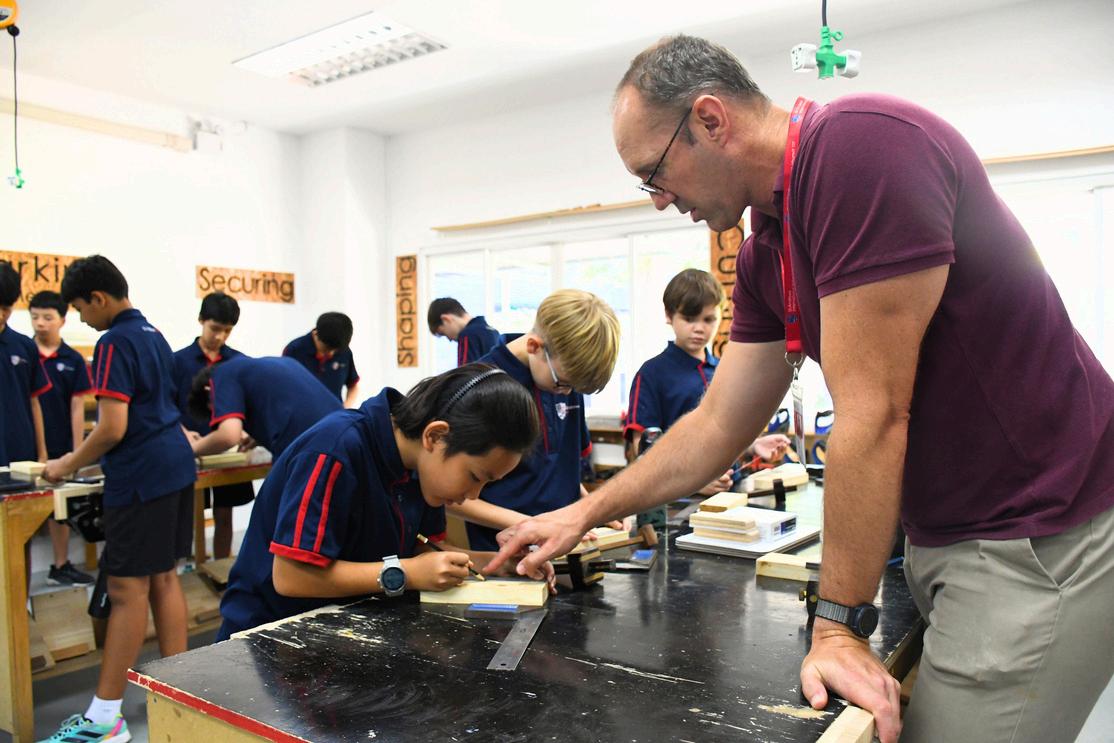
Aims
DramainKeyStage3ismadeupofthreekeyareasoflearning:
TheatreArts
Dramafor Understandin gSocialand GlobalIssues
SocialSkills
Thetheoryandpracticeoftheartoftheatre:acting,directing, producing,designing,technical.
Dramaisusedtodevelopempathy,coordination,team-buildingand team-leadingskills,aswellasconfidenceexpressingone’screative ideasandinstincts.Itisalsousedtoexploreissuesandconceptsthat applyacrosstheschoolcurriculaandtheworldatlarge.
Dramais,inessence,asocialandcollaborativeartform.Therefore studentslearnandpractiseawidevarietyoftransferableskillsabout communication,collaboration,leadership,facingchallenges, problemsolving
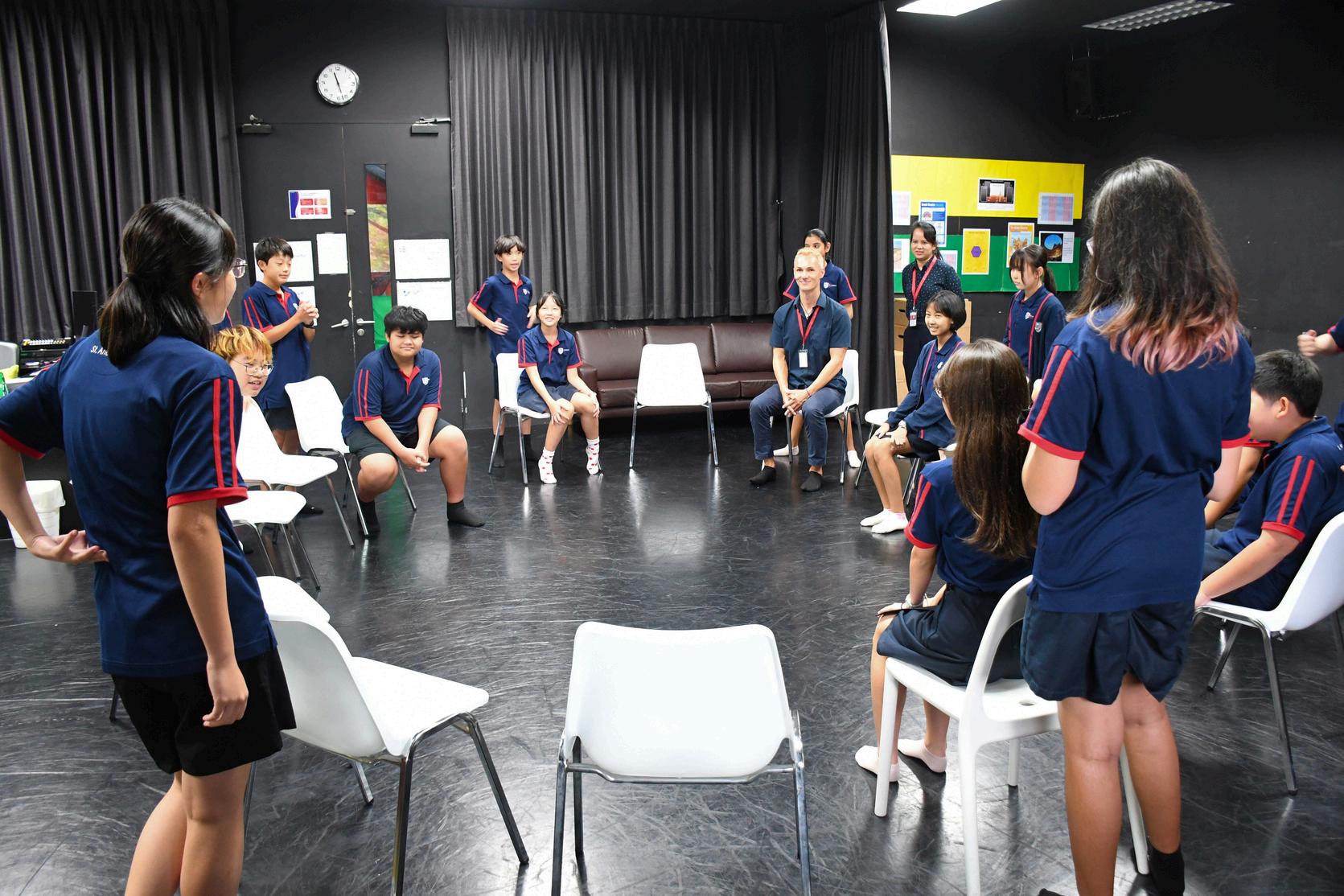
CourseOutline
StudentsstudytopicsduringKeyStage3thatincorporatethefollowingthemes:
Theseunitsareoftenfocusedonprocessandcanbecross-curricularin nature Dramaisusedtoexploreconceptsandideasinlinewiththeschool’s valuesofCare,Success,InclusionandInnovation,aswellasexpanding students’exposuretothemediumoftheatreanditscreativepotential Drama isalsousedasamethodofexaminingconcepts,ideasandperspectiveswith regardsbighumanissues.
2
3
Dramaisusedtoexploreindividualperspectivesonsocialissuesthatare relevanttothestudent’sliveseg bullying,gangmentality,powerofsocial media
Dramaencouragesthestudyoftheatricaltechniquesandculturalstorytelling traditionsfromaspecificperiodorcultureeg theCommediaDel‘Arte traditionfromItaly
4
Studentslearnstep-by-steptheprocessofbringingascriptfromthewritten wordtoaspokenperformance Theyexplorethedramaticpotentialofvarious scriptsincludingexplorationsofphysicaltheatrestaging 5
TheartformofDramaisexploredthroughassessmentofspecificskills,such asusingmovementandvoicetocreatecharacterisation Thenatureand functionoftheatreisstudiedasarekeyroleswithinthetheatreworld–designers,technicians,directors,actors,producers Assessedworkmightalso includecostumedesigns,maskmakingand/orresearchaboutaparticular theatreperiodinhistoryeg AncientGreekChorus
StudentsareassessedtermlyaccordingtotheendofKeyStage3outcomes,whicharemodified foreachyear.Assessmenttasksarevariedbutduringeachunitofstudy,studentswillbe assessedoneachofthethreefollowingtargetsatleastonce.
Making
ResponsetoStimulus/ Script
Invention/Creativity
GroupCooperation
UseOfRehearsalTime
Including,butnotlimited to:
Groupworkskills
IndividualSkills
Collaborationand communication
Preparation,motivation, engagementandfocus
Abilitytoworkwithothers
UnderstandingofDrama conventions
Chorus,mask, soundscapes
Understandingofstyle, genreorplaytext
VocalSkills Communication
Including,butnotlimited to:
Preparation,motivation, engagementandfocus
Useofvoiceand movement Characterisation
Understandingofstyle, genreorplaytext
AnalysisofTechnique
AnalysisofCharacter AnalysisofRehearsal Time
Including,butnotlimited to:
Levelsofempathyand emotionalintelligence
Leadershipskills Articulationofideas
WrittenReflectionsand responsetofeedback
UnderstandingofDrama conventions
Abilitytoanalyseand evaluate
Understandingofstyle, genreorplaytext
KeyStage3Progression
Year7
Year8
SeriousFun –IntroTo Drama Skills Ensemble
Ancient Greek Theatre History Genre Masks World
Commedia Del‘Arte History Genre Skills Masks Ernie’s Incredible Illucinations
Grimm’s Tales PSHE History Trestle Masks Skills Masks
RadioPlay
Skills Genre AND/OR/ LetHim HaveIt PSHE
Year9
Theatre Practitioner s–Stan/ Brecht/Art
Theory Skills AND/OR Kabuki Theatre World Masks Skills
Modern Theatre Practitioner s–Complicite/ Kneehigh/ Frantic Assembly Theory Skills AND/OR Pantomime History Genre
Didactic Theatre
SkillsPSHE theme “Ethical dilemma” into: FilmProject Skills Genre
FilmProject Skills Genre
Aims
Toprovidestudentsanunderstandingoftheimportantrelationshipsbetweenhumansandthe physicalworldthatfocusesontheconceptofsustainabilityinthe21stcentury.Wewishtoensure thatstudentsappreciateavarietyofopinionsandcanconfidentlyengageinconversationwith thosewithalternatingpointsofview.Ourkeystage3willprovidethemthefoundationaltoolsto transitioneffectivelyintoIGCSE,IBdiplomaandbeyond
CourseOutline
Theme1
Introductiontomapskills
Astudyofthemapskills usedingeography
Theme2 Sustainabilityand climatechange
Theme3
Fieldwork-investigating microclimates
India’sphysical geography
Theme4
Theme5
Theme6
Astudyonthephysical featuresofIndia
India’shuman geography
Astudyonthehuman featuresofIndia
Naturalhazards: Astudyontheearth’s structureandhazards
Biomes:
Astudyontheimpactof latitudeonarangeof ecosystems
FastFashion: Astudyonthewinners andlosersoftheglobal fashiontrade
Fieldworkskills: Astudyonsustainability throughgeographical enquiry
Weather: Astudyonprocesses thatcreateglobal weatherpatterns
Coasts: Astudyonthe relationshippeoplehave withthecoasts
Madagascar: Astudyonthehuman andphysicallandscape ofMadagascar
Food: Astudyonthe sustainabilityofthefood industry
Globalcrimes: Astudyontheecological impactsofhuman actions
Earthshotprize: Astudyonreducingthe impactofhumanactions inThailand
Fieldworkskills: Astudyonflooding throughgeographical enquiry
Africa: Astudyonthediversity oflandscapesand culturewithinAfrica
Humanconflicts: Astudyonthecauses andconsequencesof humanconflicts
TimeAllocation
Year7
1single(40minutes)and1doublelesson(80minutes)perweek
Year8Year9
1doublelessonperweek(80minutes)
Assessment
MoreformalassessmentsprovidedfocusonkeygeographicalskillsrequiredatIGCSE geography Assessmentswillvaryinoutcomefromgrouppresentations,independentresearch andmoretraditionalassessments.Allwillbedonewithguidedsuccesscriteriasostudentscan reflect.Formativeassessmentinlessonswillincludeactionssuchasthink-pair-share,verbal feedbackandwhiteboarduse.
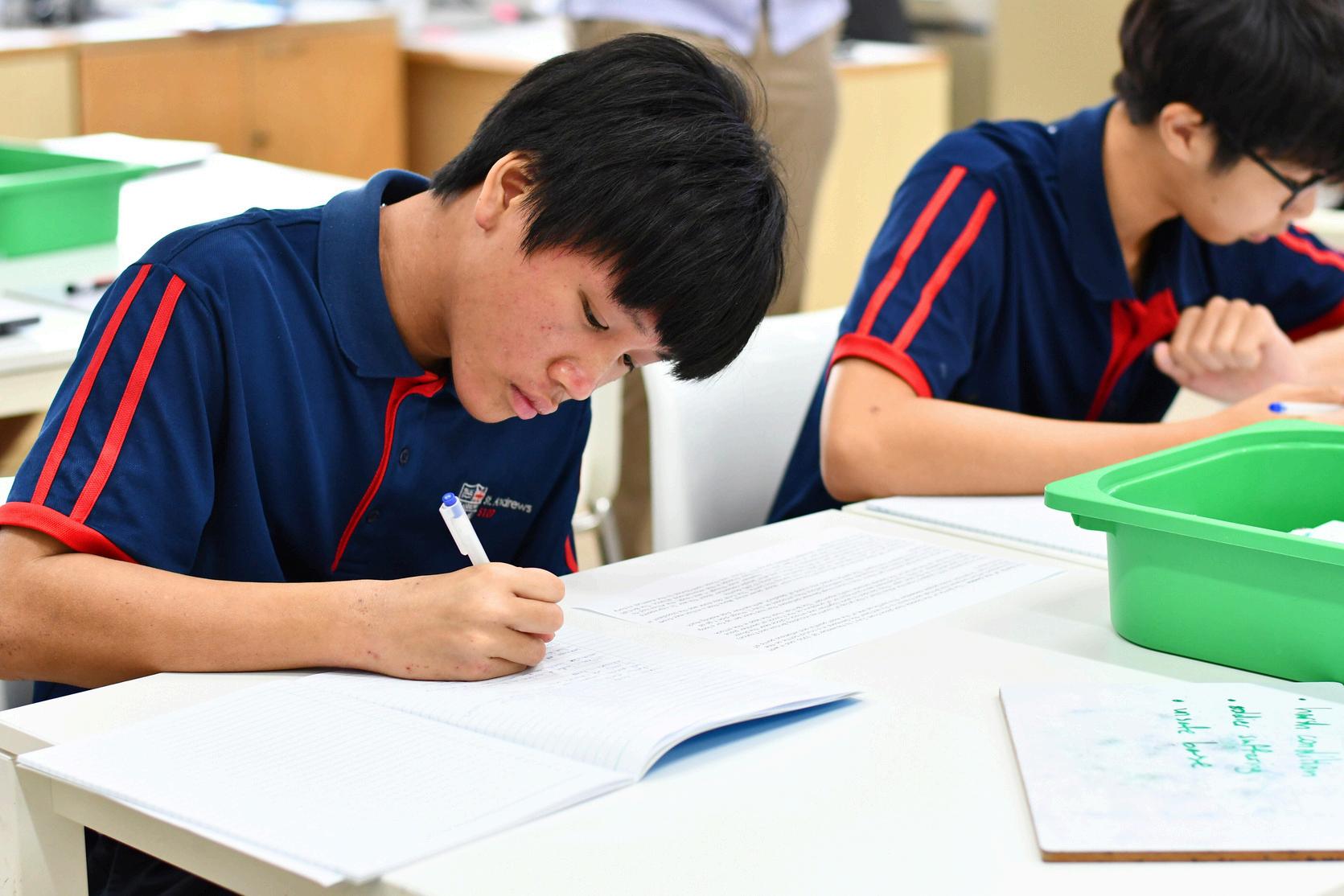
1 TheHistorycourseinKeyStage3aimstodevelopinstudents: a)Understandingofchronology.
b)Anabilitytodescribeandanalysethesignificanceofevents,theroleofmenandwomen asagentsofchangeand c)Understandthe4keyHistoricSkills:
i Interpretation
ii.Change
iii.Causeandconsequence
iv.UsingEvidence
2 Keyhistoricalturningpoints; a)Skillstocarryouthistoricalenquiryandresearchusingavarietyofsources
b)Informationprocessingskills,reasoning,creativethinkingandevaluationofsources c)Skillsinorganisingandcommunicatinghistoricalinformation;
3 Empathywithpeoplefromthepast
CourseOutline
Term1.1 UsingEvidence-FirstSettlersinThailand
Year7
Term1.2Interpretations-VikingsandGenghis Term2.1Change-EnglandintheMiddleAges Term22Change-EnglandinMiddleAges Term3Causes/consequences-SilkRoad/Columbus/Britishempire
Year8
Year9
Term1.1 Interpretation-OpiumWars
Term12UsingEvidence-Slavetrade Term21Change-USA19thcentury
Term2.2Change-Siam19thcentury
Term3CauseandConsequences-IndustrialRevolution
Term11Change-ThecausesandconsequencesofWW1
Term1.2SourceAnalysis-MurderMystery:WhokilledJFK?
Term2.1Interpretations-WhatwasthemostsignificantbattleofWW2?
Term2.2WW2LocalFocus-WhatwastheDeathRailway?
Term3Change-20thCenturyEventsthatChangedtheWorld
Theme Topic EQ Subquestions
Thailand
Benin
Howdo historians learnabout thepast?
Howdo historians learnabout thepast?
UK VikingRaiders
China Mongol Savages
Howdowe knowwhat happened 1000years ago?
Howdowe knowwhat happened 1000years ago?
Whycan't peopleagree onhistory?
Whycan't peopleagree onhistory?
SkillsFocus
WhowerethefirstsettlersinThailand?What wasitliketoliveinSukhothaiinthe12th century? Usingevidence
WhowasthemostpowerfulrulerofBenin? Usingevidence
UK Medieval England
Howmuch didEngland change duringthe MiddleAges?
China/UK /Africa Tradeand Travel-Silk Roads,Marco Polo, Columbus, Pilgrim Fathers,Benin -British Empire Whydid peopletravel tonew placesinthe MiddleAges?
WeretheVikingsReallyVicious?Was GenghisKhanasaviourorasavage? Interpretations
WeretheVikingsReallyVicious?Was GenghisKhanasaviourorasavage? Interpretations
WhathappenedwhentheNormans invadedEngland?Didlifechangefor farmersintheMiddleAges?Howmuchdid lifechangeinthecityof?London?during theMiddleAges?HowmuchdidtheBlack DeathchangeEngland? Whywasthereno feudalsystembytheendoftheMiddle Ages?
WhydidpeopletravelalongtheSilkRoadin theMiddleAges?HowdidColumbus changeAmerica?WhydidtheBritishtravel theworldinthe18thcentury?(Empire)
Change
Causationconsequences oftravel
Theme Topic EQ
UK BritishEmpire
China QingDynasty
UK/China OpiumWar
Africa/UK/ USA SlaveTrade
USA USAin19th century
Thailand Siaminthe 19thcentury
UK Industrial Revolution
SkillsFocus
WastheBritishEmpireagoodthing? Interpretation
WasBritainthemostpowerfulempireintheworld? Interpretation
WhowastoblamefortheOpiumWar?
Interpretation/c auses
Whatwastheorigins,impactandlegacyofthe TransatlanticSlaveTrade? Evidence
WhatwaslifelikeforthepeopleofAmericaby1900? Change
TowhatextentdidKingChulalongkorntransform Siam? Change
Wastheindustrialrevolutiongoodnewsforeveryone? Causesand consequences

Year9
Theme Topic EQ
World WW2andHolocaust
WastheHolocaust inevitable?
Asia WW2inAsia
UK Suffragettes
USA CivilRights Movement
China ChairmanMao
World 20thcenturysignificantevents
Whatimpactdid WW2haveon peoplelivingin Asia?
HowdidBritish womengainthe righttovotein1918?
HowfardidBlack Americanssucceed ingainingtheircivil rightsinthe1950s?
SkillsFocus
Whatwasthe holocaust?Whydid theHolocausthappen? Interpretation
China-Thailand (DeathRailway)Japan(AtomicBomb)
Causes/ conseqeunces, evidence
Causes/ conseqeunces
Causes/ consequences
Wasthe20th centuryaperiodof progress? includeOlympic GamesfromSHP Change
TimeAllocation
Y7&8-Threex45-minuteperiodsperweek
Y9-Twox45-minuteperiodsperweek
Assessment
Topicswillbeassessedthroughresearchassignmentsandessaystodemonstrateeachofthe skillslistedabove.StudentswilluseinformationsuppliedinclassandfromtheSecondaryLibrary. TheywillalsobeencouragedandguidedinuseoftheInternet.Therewillalsobeprogresstests. Historytestswilllargelyfocusonanalysisofhistoricalsources,knowledgeandwrittenanswers thatfocusonkeyconceptssuchascausesandconsequences Regularhomelearningwillbeset basedoninterpretingsources,writingtasks,roleplaypreparation,creativeworkandthinking skills
Aims
Weaimtoequipstudentswiththerightskillsandknowledgetopreparethemforarapidly changingfuture Wedothisthroughcreativity,problem-solving,andcollaboration Studentsare exposedtoawiderangeoftechnologiesandaretaughttounderstandthedynamicnatureof technologywhilstbeingmindfulofresponsibilityandethics.
Keyobjectivesinclude:
Computationalthinking-Developingtheabilitytothinklogically,tobreakdownproblems andrecognisepatternstoformulatesolutions.
ProgrammingandCodingSkills-equipstudentwithproficiencyinprogramming languages.Developalgorithms,andsolveproblemsthroughcode..
ComputerSystems-exposestudentstonewtechnologiesandprovidestudentsan understandingofcomputerhardware,softwareandnetworks
DigitalliteracyandOnlineSafety-educatingstudentsonsafeandresponsibleuseof technology,includingonlinesafety,cybersecurity,andawarenessofpotentialrisks
Creativity&Innovation-Encouragestudentstoexploretheircreativitybydesigningand developingdigitalsolutions,projects,andmultimediaapplications,fosteringinnovationand entrepreneurialskills
E-safety/Digital
Literacy
ScratchProgramming
1
Modellingdata
Spreadsheets
PhysicalComputing
GameDesign-Kodu
TimeAllocation
Twox40-minuteperiodsperweek
AppDevelopment1
Logo&Sequencing
ScratchProgramming
2
PythonCoding
Beginners
MediaandGraphics
AppDevelopment2
PythonCoding
Advance
Robotics/Microbit
Droneprogramming
3DAnimations
TheComputingdepartmentuseavarietyofmethodstoassessstudents Asteacherweare constantlyassessingstudentsineachlessonensuringlearningistakingplace Assessmentsare usuallyattheendofeachunit.Assessmentcomesin2formsasanonlinemultiplechoice assessmentand/orassessedproject.Onlineassesmentisbasedonskillsandconceptstaught foreachunit.
Aftereachassessmentstudentshaveachancetofillanygapsinknowledgeandgetdirect feedback.Gradingoftheseonlinetestsisintheformofapercentage,thesepercentagesare thenconvertedintothefollowingbandsaccordingly.
BandA:Workingabovetheexpectedlevel
BandB:Workingattheexpectedlevel
BandC:Workingbelowtheexpectedlevel
Studentsattitudetolearningisalsoreported
Asmanyunitsofstudyareofapracticalnaturehomeworkissetwhenrequired,andnot necessarilyeachweek.Thetaskmaybeofapracticalnature,researchorwrittendesignactivity. Studentswillusuallybegivenaminimumofoneweektocompletethehomelearning.Students arewelcometousetheirlaptopatbreakandlunchtime
Allstudentsareexpectedtobringintheirowndeviceaspertheschoolpolicy Theprimary deviceisalaptopthatislightandeasytocarry Ipadsandtablescanbeusedasadditional devices
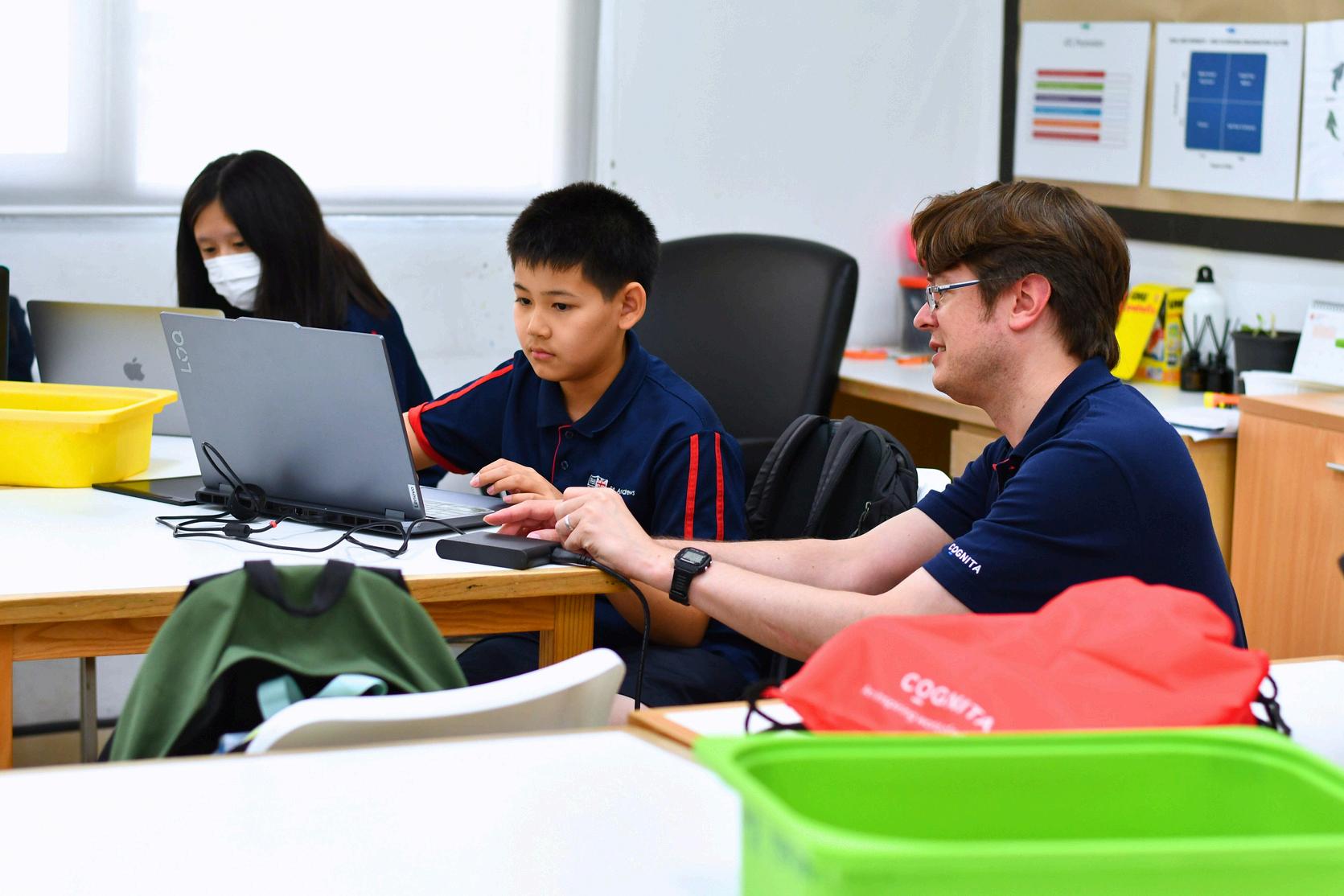
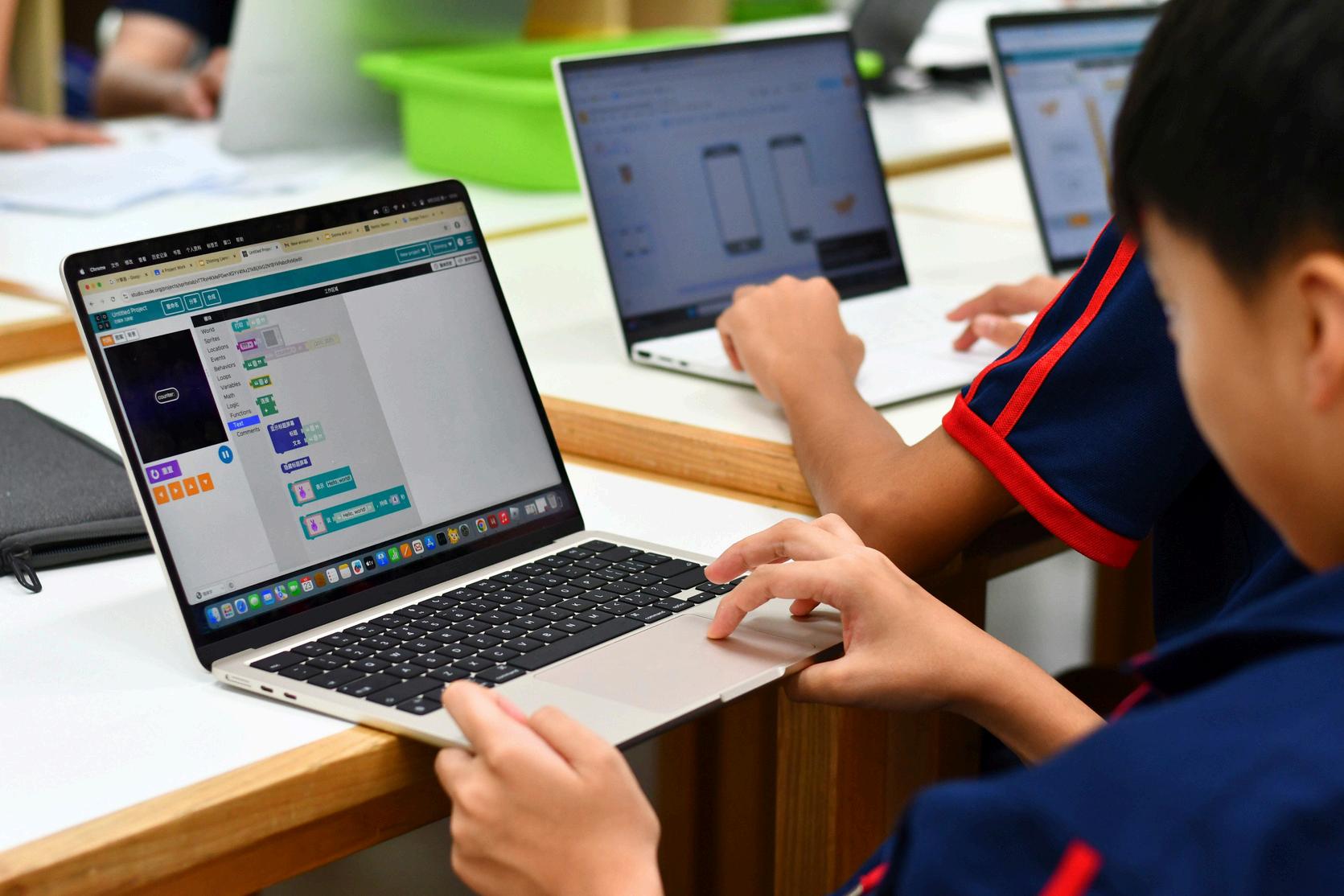
Our aim is to provide students with confidence, a love of learning language and the skills and aspirations to use them, leading to much improved functional English skills, both socially and academically,toenableallourEALstudentsaccesstothefullcurriculumassoonaspossible
The EAL programmeme aims to improve all 4 English skills of Speaking, Listening, Reading and Writingusingthefollowingfocusareas:
Improvingreadingandcomprehensionskillswithgroupstudyandindependenthomestudy usingreadingjournals
Developingwritingskillsbyusingspecificplansfordifferenttypesofwriting
Listeningpractisebothindependentlyandathomewithguidance
Confidence building along with vocabulary development practising speaking for different situations
Timedwritingexercises
Subject-specificvocabularyfrommainstreamsubjects
Inaddition,KeyStage3EALstudentswillcompleteweeklyreadingjournals
These form the basis of students’ home learning and parents are asked to sign them each week.
TimeAllocation
KeyStage3contains3phasesthatarecalculatedatadmission: Intensive:8lessonsperweekplusin-classsupportinScience Intermediate:4lessonsperweekplusin-classsupportinScience Standard:2lessonsperweek
Assessment
At admission students are tested to find our which EAL phase they need to be in In addition to this:
Thereare2formativeassessmentspertermandresultsaresenthometoparents. StudentsmovebetweentheIntensive,intermediateandStandardphasesbasedontheirendof termassessmentresults
At the end of Term 3 all EAL students have the option to be entered in to the internationally recognisedCambridgeInternationalLanguageExams:KeyEnglishTest,PreliminaryEnglishTest andFirstCertificate
All students are continually assessed during lessons and both verbal and written feedback is giventothem
KeyStage3contains3phasesthatarecalculatedatadmission:
Intensive:10lessonsperweekplusin-classsupportinScience
StudentsdevelopEnglishinthefollowingareas:
SurvivaleverydayEnglishandclassroomlanguagelanguage
Sociallanguagetodevelopfriendshipsandcontacts
Partsofspeech
Basicgrammar-pastandpresenttenses
Basicsentencestructure
DevelopingbasicTier1vocabulary
Phonicsandpronunciationstudyandpractise
Intermediate:6lessonsperweekplusin-classsupportinScience
LearninglanguageforsituationsincludingformalandinformalEnglishandmoreadvanced sociallanguagetofurtherdevelopfriendshipsandcontacts
Intermediatesentencestructuresusingclausesanddevelopingskillstoextendwritingand speaking
grammar-pastandpresenttenses
DevelopingIntermediateTier2vocabulary
Guidedreadingandskillbuildingforcomprehension
HumanitiesbasedEALprogrammemewherestudentsdevelopEnglisharoundthecontextof geography,historyandsocialstudies
Standard:2-3lessonsperweek
LearninglanguageforsituationsincludingformalandinformalEnglishandmoreadvanced sociallanguagetofurtherdevelopfriendshipsandcontacts
Advancedsentencestructuresdevelopingskillstoextendbothsocialandacademicwriting andspeaking
Advancedgrammar-alltensesandstructures
DevelopingAdvancedmulti-meaningTier3vocabularythatcoversallsubjectareas
Guidedreadingandskillbuildingforcomprehension
HumanitiesbasedEALprogrammemewherestudentsdevelopEnglisharoundthecontextof geography,historyandsocialstudies
OncestudentshavereachedthegraduationleveltheystophavingEALlessons,andin-class support,andareinsteadmonitored.
FraserInternationalCollege
McMasterUniversity
Queen'sUniversity
SouthernAlbertaInstituteof Technology
*TheUniversityofBritish Columbia UniversityCanadaWest UniversityofManitoba UniversityofToronto
Scarborough UniversityofVictoria UniversityofWaterloo UniversityofWesternOntario Canada
AngliaRuskinUniversity
BritishandIrishModernMusicInstitute
*KingsCollegeLondon
LoughboroughUniversity
NewcastleUniversity
NorthumbriaUniversity
*QueensUniversityBelfast
*TrinityCollegeDublin
*St.AndrewsUniversity
*UniversityCollegeLondon UniversityofBrighton UniversityofBristol UniversityofEastAnglia UniversityofEssex UniversityofLiverpool UniversityofManchester UniversityofPlymouth UniversityofReading UniversityoftheWestofEngland,Bristol UniversityofWestLondon
AmsterdamUniversityofAppliedSciences, Netherlands
FontysUniversityofAppliedSciences, Netherlands
HanzeUniversityofAppliedSciences, Netherlands
IEBusinessSchool,Madrid,Spain
KarelDeGroteUniversity,Belgium KarlsruheInstituteofTechnology,Germany
LeidenUniversity,Netherlands
SaxionUniversityofAppliedSciences, Netherlands
TechnicalUniversityofEindhoven, Netherlands
TechnicalUniversityofMunich(TMU), Germany
TheUniversityofBarcelona,Spain
TilburgUniversity,Netherlands UniversityofAmsterdam,Netherlands UniversityofTwente,Netherlands
UtrechtUniversity,Netherlands
*BerkleeSchoolofMusic
BrighamYoungUniversity
FloridaInstituteofTechnology
LesleyUniversityBoston
LosAngelesFilmSchool
MarymountManhattanCollege
OccidentalCollege
RutgersUniversity
*UMassBoston
UniversityofCalifornia,Irvine UniversityofDelaware
UniversityofKansas
AssumptionUniversity
BangkokUniversity
ChulalongkornUniversity
*ChulalongkornUniversity
DusitThaniCollege
KasetsartUniversity
KingMongkut’sInstitutionofTechnology
Ladkrabang(KMITL)
MahidolUniversity
SilpakornUniversity
*ThammasatUniversity
ManipalInstituteofTechnology,India NationalTsinghuaUniversity,Taiwan SophiaUniversity,Japan
TempleUniversity,Japan UniversityofHongKong,HongKong
MacquarieUniversity
SAEInstitute
TheUniversityofWestern Australia UniversityofMonash UniversityofNewSouthWales
*UniversityofSydney UniversityofTechnology
SydneyCollege
